#Charles Washington Henry
Text
La Fayette's Opinion on Court Martials
Tl;dr: La Fayette was much opposed to court martials.
This was intended as a post about La Fayette’s opinions on the death penalty and the reform of penal law – however, I think it is worthwhile to have a look at his opinion on court martials and the different systems used by different nations (France, England, America and to some extend Poland)
Now, La Fayette expressed his opinion for the first time in a written document that we knew of in a letter to George Washington on January 13, 1778. Although that is his first time expressing such notions to Washington, by the points that he raises it is evident that he has held these believes for some time. The trigger for La Fayette writing this letter was the court martial of two of his subordinate officers:
At the same [General] Court held 6th instant Captain Flagg charged with “neglect of duty 1st in suffering the Marquis de la Fayette, when Major Genl of the day to come in the night to the center of his Picquet, without being stopped or challenged; 2nd for permitting his sentries to have fires in his sight” was tried and acquitted by the unanimous opinion of the court. The Commander in Chief approves the sentence.
At the same Court held 7th instant Captn Laird, charged with “Neglect of duty, in suffering the Major General of the day to surprize him at his picquet in the night”—was tried & found guilty and sentenced to be dismissed from the service.
The Commander in Chief approves the sentence.
“General Orders, 13 January 1778,” Founders Online, National Archives, https://founders.archives.gov/documents/Washington/03-13-02-0180. [Original source: The Papers of George Washington, Revolutionary War Series, vol. 13, 26 December 1777 – 28 February 1778, ed. Edward G. Lengel. Charlottesville: University of Virginia Press, 2003, pp. 214–216.] (10/24/2023)
And here a screenshot from the notes beneath this letter to give some biographical information on the two men in question.

La Fayette wrote his letter the same day and described the situation as follows:
There were two gentlemen, same rank, same duty to perform, and same neglect of it who have been arrested the same day by me—as I went in the night around the piquets I found them in fault, and I gave an account of it the next day to your excellency—you answered that I was much in wrong not to have had them relieved and arrested immediately—I objected that it was then very late for such a changement, and that I did not know which was the rule in this army, but that the gentlemen should be arrested in that very moment—the last answer of your excellency has been, “they are to have a court martial, and you must give notice of it to the adjudant general”—therefore major nevill made two letters in order to arrest them, one for having been surprised in his post and the other, for the same cause and allowing his centrys to have fires which he could see in standing before the picquet. I give you my word of honor that there was not any exageration.
“To George Washington from Major General Lafayette, 13 January 1778,” Founders Online, National Archives, https://founders.archives.gov/documents/Washington/03-13-02-0186. [Original source: The Papers of George Washington, Revolutionary War Series, vol. 13, 26 December 1777 – 28 February 1778, ed. Edward G. Lengel. Charlottesville: University of Virginia Press, 2003, pp. 222–225.] (10/24/2023)
Beside his recalling of the situation, it can also be noticed that La Fayette was unfamiliar with the system of court-martials in America and used to different proceedings from his time in the French army.
Before we address La Fayette’s grievances with the court martial system in the Continental Army in general and with these cases in particular, here is his account of the proceedings in France:
(…) in france an officer is arrested by his superior, who gives notice of it to the commanding officer, and then he is punished enough in being deprived of going out of his room in time of peace, of doing his duty in time of war—no body knows of it but his comrades—when the fault is greater he is confined in a common room for prisonner officers and this is much more shamefull—notice of it is immediately given to the general officer who commands there—that goes too to the Kings minister who is to be reimplaced here by the commander in chief—in time of war it goes to the general in chief.
Soldiers are punished the same or next day by order of proper officers, and the right of punishing is proportionate to theyr ranks.
but when Both officers and soldiers have done something which deserves A more severe punishement, when theyr honor, or theyr life, or theyr liberty for more than a very short time is concerned, then a court martial meets, and the sentence is known—how will you let an unhappy soldier be confined several weeks, with men who are to be hanged, with spies, with the most horrid sort of people, and in the same time be lost for the duty, when they deserve only some lashes—then almost no proportion in the punishements.
Now, his first problem were the punishments – or better; lack thereof. You recall that Captain Ebenezer Flagg was acquitted:
now I See in the orders the less guilty punished in a manner, much too severe indeed, and dismised from the service (it is among all the delicate minds deprived of his honor) when he was only to be severely reprimanded, and kept for some time under arrest—but it can be attributed to a very severe discipline.
This acquittal was not only bothersome for La Fayette because Captain David Laird, who committed a less serious crime in La Fayette’s eyes, was so harshly punished. Part of the problem laid also in his perception of a gentleman’s word of honour:
what must I think of the same court when they unanimously acquit (it is to say that my accusation is not trüe) the officer who joins to the same fault, entirely the same, this of allowing his centrys to have fire in his own sight—for in every service being surprised or being found in the middle of his picquet without any challenging or stopping centry, as major nevil riding before me found him, is entirely the same thing—and mjor nevil riding before me when I was busy to make a centry pull off his fire, can swear that such was the case with that officer—he can do more than swearing, for he can give his word of honor—and I think that idea honor is the same in every country but the prejugées are not the same thing—for giving publickly the best of such a dispute (for here it becomes a trial for both parties) to an officer of the last military stage against one of the first, schould be looked on as an affront to the rank, and acquitting a man whom one other man accuses, looked upon as an affront to the person—it is the same in poland for count de pulaski was much affronted of the decision of a court martial entirely acquitting Colonel molens—however as I know the english costoms I am nothing else but surprised to see such a partiality in a court martial.
We read that La Fayette was not alone in his perception here and that other foreign officers, in this case Kazimierz Pułaski, were of the same opinion. His comment on the “english costoms” will be of some important later on.
But beside the critic he mentioned specifically in context of this affair, there were still more general points of criticism that La Fayette had – there were three points in total:
how is it possible to carry a gentleman before a parcel of dreadful judges at the same place where an officer of the same rank has been just now cashiered, for a trifling neglect of his duty, for, I suppose, speaking to his next neighbour in a maneuvre, for going into a house to speack to a pretty girl, when the army is on his march and thousand other things—how is it possible to bring to the certainty of being cashiered, or dishonored, a young lad, who has made a considerable fault because he had a light head, a too great vivacity, when that young man would be perhaps in some years the best officer of the army, if he had been friendly reprimanded and arrested for some time, without any dishonor.
the law is alwaïs severe, and bring with it an eternal Shamefull mark—when the judges are partial as in this occasion, it is much worse, because they have the same inconveniences as law itself.
in court martials men are judged by theyr inferiors—how (mutilated) to discipline I do’nt want to say—the publication exposes men to (mutilated) despised by the least soldier—when men have been before a court martial they schould be or acquitted or dismissed—what do you think can be produced by the half conndemnation of a general officer—what necessity for all the soldiers, all the officers, to know that general maxwell has been prevented from doing [h]is duty by his being drunk. Where is the man who will not laugh at him if he is told by him you are a drunkard and is it right to ridicule a man repectable by his rank, because he drank two or three gills of rum.
there are my reasons against court martials, when there is not some considerable fault to punish—according to my affair I am sorry in seeing the less guilty being the only one punished however, I shall send to court martials but for such a crimes, that there will be for the judges no way of indulgence and partiality. With the most tender respect I am Your excellency’s the most obedient servant
While La Fayette sounded almost a bit rebellious in his last sentence, it was not that he was entirely against court martials, he simply wanted them reserved for more serious offenses.
your excellency will certainly approuve my not arresting any officer for being brought before a court martial, for any neglect of duty, but when they will be robbers, or cowards, or when they will assassinate, in all when the[y] will deserve being cashiered or put to death.
The American system of court martials was molded after the English system and La Fayette was not quite happy with that either. Again, in the same letter to Washington from January 13, 1778 he wrote:
give me leave, to tell your excellency how I am adverse to court martials—I know it is the english costom, and I believe it is a very bad one—it comes from theyr love of lawers, speakers, and of that black apparate of sentences, and judgements—but such is not the american temper, and I think this new army must pick up the good institutions, and leave the bad ones where ever they may be (…)
Since I picked the letter so much apart, I will put a full and continuous version beneath the cut. :-)
Washington was not the only person, nor this the only incident where La Fayette expressed his displeasure about court martials. He wrote in a letter to Henry Laurens in his official position as President of Congress on March 20, 1778:
There as been a court martial for desertion which I din’t approuve of, but as among other men I have found sentenc’d of death, I beg from Congress to be empowered to relieve the man.
Idzerda Stanley J. et al., editors, Lafayette in the Age of the American Revolution: Selected Letters and Papers, 1776–1790, Volume 1, December 7, 1776–March 30, 1778, Cornell University Press, 1977, p. 365.
Despite being against court martials, La Fayette was naturally involved in a number of trials one way or another. He for example took part in two famous court martial cases, the cases of Charles Lee and Major John André. In Lee’s proceedings, La Fayette was a witness and wrote to Henry Laurens on July 6, 1778:
You have heard good deal, I dare say, of the court against Gal. Lee. I am very unwillingly an evidence in it but am happy enough as to have nothing material to say. This Gal. Lee is very much prejudic’d in favor of his english nation. If he is condemn’d, certainly he must be guilty of some thing very ugly.
Idzerda Stanley J. et al., editors, Lafayette in the Age of the American Revolution: Selected Letters and Papers, 1776–1790, Volume 3, April 27, 1780–March 29, 1781, Cornell University Press, 1980, p. 99.
Even in this short abstract La Fayette clearly states his opinion of General Charles Lee. It was not a very high opinion. He thought that Lee had acted badly during the battle, that he was prejudice, and that Washington was in the right when giving him a dressing down. Still, La Fayette was not in favour of the court martial and much resented being a part of it. We can see that his aversion for court martials, was not based on personal sympathies. He rejected these proceedings no matter the circumstances or the person accused.
Another great, but more complex, matter was the court martial of John André. La Fayette sat from September 29 to September 30, 1780 on the court martial of John André and was therefore among the men who found him guilty. He wrote to the Vicomte de Noailles (the husband of his sister-in-law) about his role in the proceeding on October 3, 1780.
But what has truly afflicted me is the necessity of hanging the adjutant general of the British army, a charming man who conducted himself throughout, and died, like a hero. This severity was necessary; the enemy acted very stupidly on this occasion, and since they lost that unfortunate man, the soul of their army, they have not written one letter that had common sense. Andre was executed yesterday. General Clinton’s anger does not frighten us, but this man's death, although inevitable in my opinion, left me with a feeling of sadness and respect for his character. I truly suffered in condemning him; but he was an officer under disguised clothing and name, passing within our posts with papers full of intelligence for the enemy, and he himself did not hesitate to recognize himself as a spy.
Idzerda Stanley J. et al., editors, Lafayette in the Age of the American Revolution: Selected Letters and Papers, 1776–1790, Volume 3, April 27, 1780–March 29, 1781, Cornell University Press, 1980, p. 182.
La Fayette’s aversion to court martials meets here his personal sympathy and respect for John André and his opinions (although they were still very much developing at this point in time) about the death penalty.
Out of the recorded 3315 court martials recorded in the continental army during the War of American Independence, La Fayette was involved in a number of them. We dissected the cases of Flagg, Laird, Lee and André. A forage master under his command was tried on February 19, 1778:
At a General Court-Martial whereof Col. Cortlandt was President (Feby 19th 1778) Mr Edward Bennett Forage-Master in the Marquis La Fayette’s division tried for repeated neglect of duty in suffering the horses of the division to remain three days without Forage when there was Forage in the General Forage yard, and all the divisions in the Army drew, for neglecting to draw hay when to be got and for trusting to others what he should himself perform by which many horses in the division have perished and the whole of the teams rendered unfit for duty. (…) The Court are therefore unanimously of opinion that Mr Bennett has been neglectful of his duty in not getting forage for the horses of the division to which he belongs when it could have been procured whereby many of them have perished for the want of it, being a breach of Article 5th Section 18th of the Articles of War and they do sentence him to be dismissed from his employment in the forage department.
“General Orders, 24 February 1778,” Founders Online, National Archives, https://founders.archives.gov/documents/Washington/03-13-02-0555. [Original source: The Papers of George Washington, Revolutionary War Series, vol. 13, 26 December 1777 – 28 February 1778, ed. Edward G. Lengel. Charlottesville: University of Virginia Press, 2003, pp. 652–653.] (10/24/2023)
He also ordered the court martial of Lieutenant William Mills on September 15, 1780:
At a division General court martial the 15th instant by order of Major General Marquis de la Fayette, Colonel Swift President Lieutenant William Mills of Colonel Gematt’s regiment of Light Infantry was tried for “Disobedience of Orders” and unanimously acquitted.
“General Orders, 18 September 1780,” Founders Online, National Archives, https://founders.archives.gov/documents/Washington/03-28-02-0160. [Original source: The Papers of George Washington, Revolutionary War Series, vol. 28, 28 August–27 October 1780, ed. William M. Ferraro and Jeffrey L. Zvengrowski. Charlottesville: University of Virginia Press, 2020, pp. 222–223.] (10/24/2023)
He further ordered a court martial for Captain Wilkin on September 12, 1781:
At a General Court Martial assembled at Williamsburgh September 12th 1781 by order of Major General the Marquis de la Fayette Colonel Vose President—Captain Wilkin of Colonel Stewarts Battalion of the Pennsylvania line, charged by Col Stewart with riotous behavior in his tent at an unseasonable hour of the Night; with disobedience of orders in not desisting when ordered so to do by the field Officer of the day through the Adjutt Captain Vanhorn and for using language and conduct subversive of good order and Discipline, was tried and acquited.
The Commander in Chief approves the Opinion of the Court. Captain Wilkin is released from his Arrest.
“General Orders, 25 September 1781,” Founders Online, National Archives, https://founders.archives.gov/documents/Washington/99-01-02-07015. [This is an Early Access document from The Papers of George Washington. It is not an authoritative final version.] (10/24/2023)
La Fayette also was asked by General Wayne to approve a verdict by a court martial ordered by Wayne himself. The soldier in question, James Grant, was from Virginia and La Fayette was popular with the Virginias and Wayne not. Wayne wrote on August 10, 1781, the day after Grant’s trial:
Inclosed is the proceedings of a Genl. Court Martial. Was it held on a soldier belonging to the Pennsa. Line I should not have the least difficulty or a moments hesitation in Confirming it because if this Culprit should pass with Impunity-it may open a door to worse [occurrences?]. But as it is a private of the Virginia Line I beg leave to commit it to your Decission.
Idzerda Stanley J. et al., editors, Lafayette in the Age of the American Revolution: Selected Letters and Papers, 1776–1790, Volume 4, April 1, 1781–December 23, 1781, Cornell University Press, 1981, pp. 309-311.
Grant was found guilty of shooting Captain Abraham Kirkpatrick whom he allegedly found in bed with his wife.
This list is by no means intended to be conclusive, there were probably many more cases La Fayette was involved in, these were just the ones I could present after a relatively quick search. This is more meant to give you a felling for La Fayette’s behavior in such situations.
Marquis de La Fayette to George Washington, January 13, 1778:
dear general
I Schall make use in this particular instance of the liberty you gave me of telling freely every idea of mine which could strike me as not being useless to a better order of things.
There were two gentlemen, same rank, same duty to perform, and same neglect of it who have been arrested the same day by me—as I went in the night around the piquets I found them in fault, and I gave an account of it the next day to your excellency—you answered that I was much in wrong not to have had them relieved and arrested immediately—I objected that it was then very late for such a changement, and that I did not know which was the rule in this army, but that the gentlemen should be arrested in that very moment—the last answer of your excellency has been, “they are to have a court martial, and you must give notice of it to the adjudant general”—therefore major nevill made two letters in order to arrest them, one for having been surprised in his post and the other, for the same cause and allowing his centrys to have fires which he could see in standing before the picquet. I give you my word of honor that there was not any exageration.
now I See in the orders the less guilty punished in a manner, much too severe indeed, and dismised from the service (it is among all the delicate minds deprived of his honor) when he was only to be severely reprimanded, and kept for some time under arrest—but it can be attributed to a very severe discipline.
what must I think of the same court when they unanimously acquit (it is to say that my accusation is not trüe) the officer who joins to the same fault, entirely the same, this of allowing his centrys to have fire in his own sight—for in every service being surprised or being found in the middle of his picquet without any challenging or stopping centry, as major nevil riding before me found him, is entirely the same thing—and mjor nevil riding before me when I was busy to make a centry pull off his fire, can swear that such was the case with that officer—he can do more than swearing, for he can give his word of honor—and I think that idea honor is the same in every country but the prejugées are not the same thing—for giving publickly the best of such a dispute (for here it becomes a trial for both parties) to an officer of the last military stage against one of the first, schould be looked on as an affront to the rank, and acquitting a man whom one other man accuses, looked upon as an affront to the person—it is the same in poland for count de pulaski was much affronted of the decision of a court martial entirely acquitting Colonel molens—however as I know the english costoms I am nothing else but surprised to see such a partiality in a court martial.
your excellency will certainly approuve my not arresting any officer for being brought before a court martial, for any neglect of duty, but when they will be robbers, or cowards, or when they will assassinate, in all when the[y] will deserve being cashiered or put to death.
give me leave, to tell your excellency how I am adverse to court martials—I know it is the english costom, and I believe it is a very bad one—it comes from theyr love of lawers, speakers, and of that black apparate of sentences, and judgements—but such is not the american temper, and I think this new army must pick up the good institutions, and leave the bad ones where ever they may be—in france an officer is arrested by his superior, who gives notice of it to the commanding officer, and then he is punished enough in being deprived of going out of his room in time of peace, of doing his duty in time of war—no body knows of it but his comrades—when the fault is greater he is confined in a common room for prisonner officers and this is much more shamefull—notice of it is immediately given to the general officer who commands there—that goes too to the Kings minister who is to be reimplaced here by the commander in chief—in time of war it goes to the general in chief.
Soldiers are punished the same or next day by order of proper officers, and the right of punishing is proportionate to theyr ranks.
but when Both officers and soldiers have done something which deserves A more severe punishement, when theyr honor, or theyr life, or theyr liberty for more than a very short time is concerned, then a court martial meets, and the sentence is known—how will you let an unhappy soldier be confined several weeks, with men who are to be hanged, with spies, with the most horrid sort of people, and in the same time be lost for the duty, when they deserve only some lashes—then almost no proportion in the punishements.
how is it possible to carry a gentleman before a parcel of dreadful judges at the same place where an officer of the same rank has been just now cashiered, for a trifling neglect of his duty, for, I suppose, speaking to his next neighbour in a maneuvre, for going into a house to speack to a pretty girl, when the army is on his march and thousand other things—how is it possible to bring to the certainty of being cashiered, or dishonored, a young lad, who has made a considerable fault because he had a light head, a too great vivacity, when that young man would be perhaps in some years the best officer of the army, if he had been friendly reprimanded and arrested for some time, without any dishonor.
the law is alwaïs severe, and bring with it an eternal Shamefull mark—when the judges are partial as in this occasion, it is much worse, because they have the same inconveniences as law itself.
in court martials men are judged by theyr inferiors—how ⟨mutilated⟩ to discipline I do’nt want to say—the publication exposes men to ⟨mutilated⟩ despised by the least soldier—when men have been before a court martial they schould be or acquitted or dismissed—what do you think can be produced by the half conndemnation of a general officer—what necessity for all the soldiers, all the officers, to know that general maxwell has been prevented from doing [h]is duty by his being drunk. Where is the man who will not laugh at him if he is told by him you are a drunkard and is it right to ridicule a man repectable by his rank, because he drank two or three gills of rum.
there are my reasons against court martials, when there is not some considerable fault to punish—according to my affair I am sorry in seeing the less guilty being the only one punished however, I shall send to court martials but for such a crimes, that there will be for the judges no way of indulgence and partiality. With the most tender respect I am Your excellency’s the most obedient servant
The mquis de lafayette
“To George Washington from Major General Lafayette, 13 January 1778,” Founders Online, National Archives, https://founders.archives.gov/documents/Washington/03-13-02-0186. [Original source: The Papers of George Washington, Revolutionary War Series, vol. 13, 26 December 1777 – 28 February 1778, ed. Edward G. Lengel. Charlottesville: University of Virginia Press, 2003, pp. 222–225.] (10/24/2023)
#marquis de lafayette#la fayette#french history#american history#american revolution#history#letter#founders online#george washington#henry laurens#anthiny wayne#1778#1780#1781#charles lee#thomas conway#john andré
37 notes
·
View notes
Text
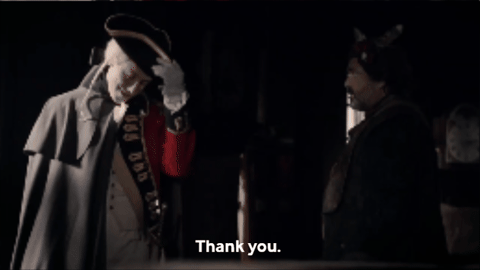
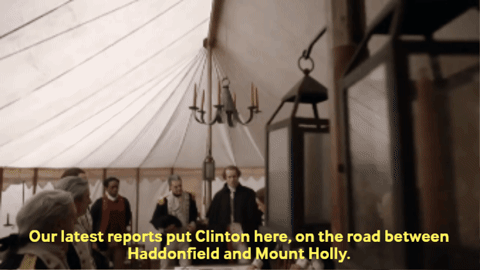

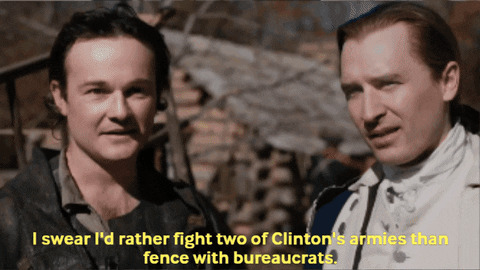



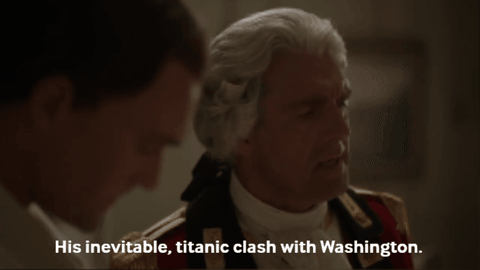
Full General Sir Henry Clinton in TURИ (Mentions)
Grand Knight Cross of Bath, Commander-in-Chief, He Who History Frowns Upon
TURN and Henry Clinton [ 1 / ? ]
#history#amrev#turn: washington's spies#sir henry clinton#gifs#gifset#my gifs#benedict arnold#lord charles cornwallis#turn amc#american revolution#period drama
10 notes
·
View notes
Text
George: you are relieved from your duty
Charles: nuh uh
George: the fuck you mean nuh uh
James and Henri: *laughing*
15 notes
·
View notes
Text



three things:
they made almost all the republicans sit in the back
one seat distance between seward and sumner & davis and douglas makes me supremely sorry for whoever is sitting there (also fessenden is right before sumner, which makes me imagine that he's having a very bad time listening to the two guys snapping at each other from behind him)
apparently the way people determined which seats were Good or Bad in the senate back then was based on
a. how close it was to the president's chair and
b. how close it was to known popular kid william seward
#the congressional incubator#jefferson davis#james henry hammond#andrew johnson#jefferosn davis#stephen douglas#john crittenden#john parker hale#charles sumner#william seward#william fessenden#benjamin wade#washington brotherhood
2 notes
·
View notes
Text
James Bond fancast
Following the end of the Craig era, I'll cast for the potential one with some choices
Directed, produced and written by Christopher Nolan

Produced by Lorenzo di Bonaventura

Produced and written by Luc Besson,

Jonathan Nolan

and Emma Thomas
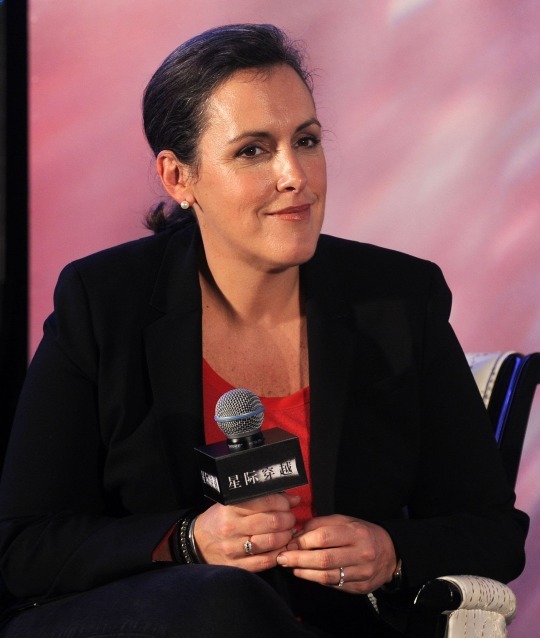
Written by Michael Cuesta

Composed by Ludwig Göransson

Edited by Jennifer Lame

Cinematography by Pierre Morel

For the production companies, there would be


and
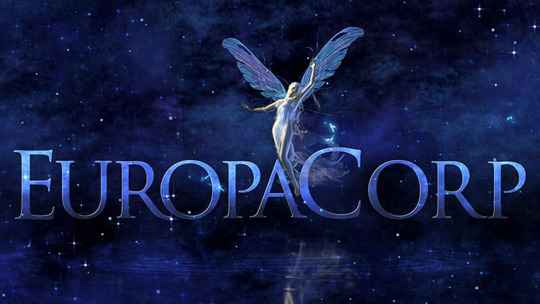
Distributed by

Idris Elba as my choice #1 for James Bond

Henry Cavill as my choice #2 for James Bond

Benedict Cumberbatch as the Bond villain
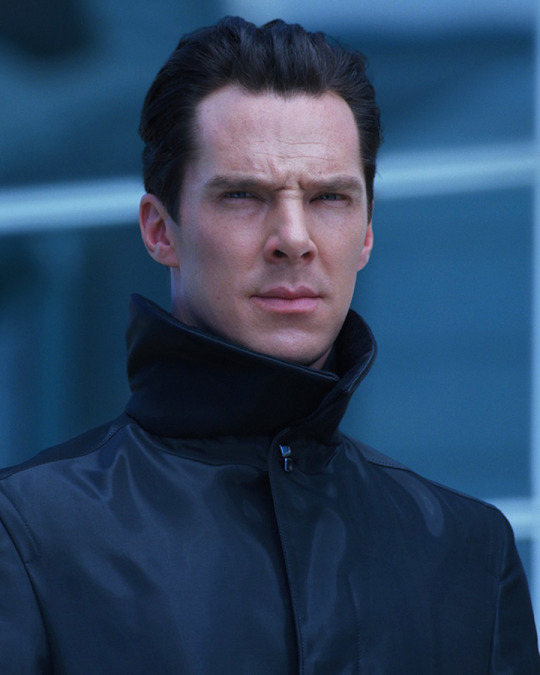
Gemma Chan as the Bond Girl #1

Adèle Exarchopoulos as the Bond Girl #2

Anne Hathaway as the secondary Bond villainess

Hafþór Júlíus Björnsson as the Henchman

Liam Neeson as M

Charles Dance as Q

Hayley Atwell as Miss Moneypenny
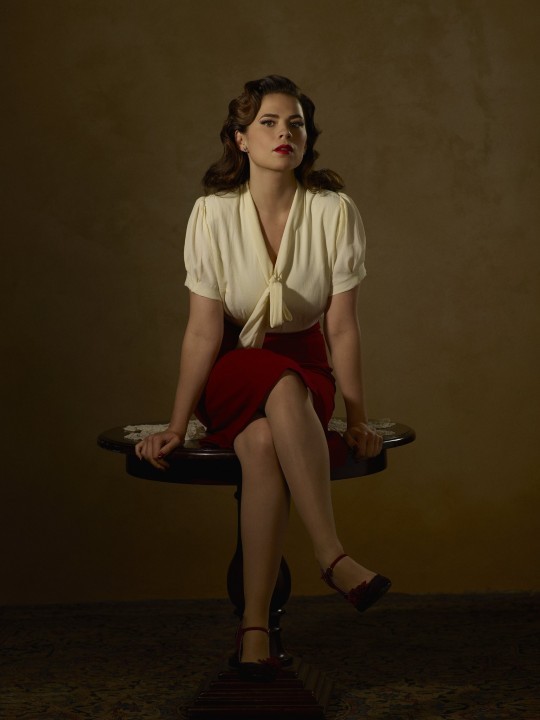
John David Washington as Felix Leiter
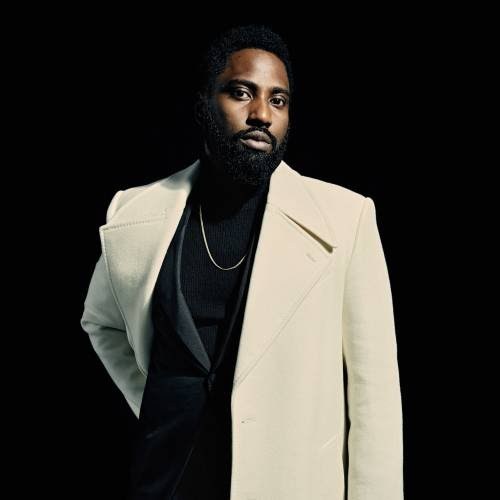
Navid Negahban as the tertiary Bond villain
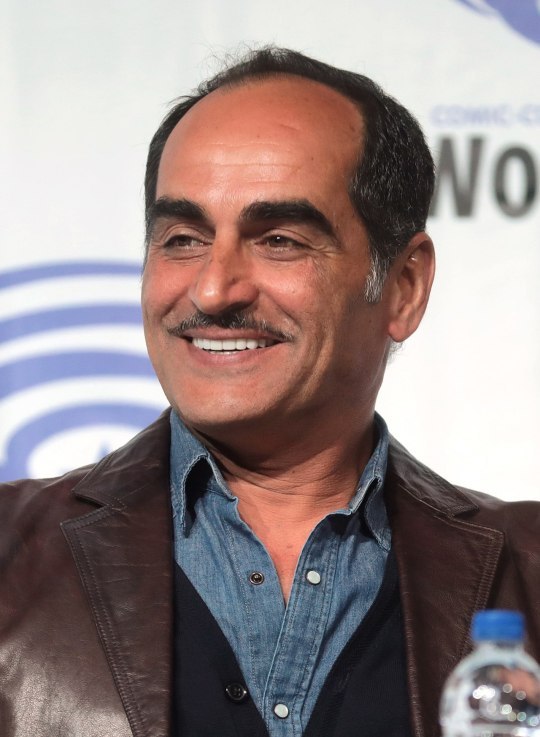
Mark Strong as Ernst Stavro Blofeld

#james bond#fancast#henry cavill#idris elba#navid negahban#liam neeson#anne hathaway#hafþór júlíus björnsson#hayley atwell#adèle exarchopoulos#charles dance#john david washington#warner bros#benedict cumberbatch#mark strong#gemma chan#christopher nolan#syncopy#Legendary Pictures#emma thomas#luc besson#pierre morel#bond girl#bond villain#felix leiter#miss moneypenny#jonathan nolan
5 notes
·
View notes
Text


🤲🤲
Pictures by Rupert Charles Wulsten Bunny, George Loring Brown, Washington Allston, Alexandre Georges Henri Regnault, Antoine Joseph Wiertz and Severin Roesen
#genshin impact#genshin art#genshin#genshin impact art#genshin impact fanart#haikaveh#kavetham#kaveh#genshin kaveh#al haitham#genshin al haitham#alhaitham#genshin alhaitham
718 notes
·
View notes
Text
Reading list for Afro-Herbalism:
A Healing Grove: African Tree Remedies and Rituals for the Body and Spirit by Stephanie Rose Bird
Affrilachia: Poems by Frank X Walker
African American Medicine in Washington, D.C.: Healing the Capital During the Civil War Era by Heather Butts
African American Midwifery in the South: Dialogues of Birth, Race, and Memory by Gertrude Jacinta Fraser
African American Slave Medicine: Herbal and Non-Herbal Treatments by Herbert Covey
African Ethnobotany in the Americas edited by Robert Voeks and John Rashford
Africanisms in the Gullah Dialect by Lorenzo Dow Turner
Africans and Native Americans: The Language of Race and the Evolution of Red-Black Peoples by Jack Forbes
African Medicine: A Complete Guide to Yoruba Healing Science and African Herbal Remedies by Dr. Tariq M. Sawandi, PhD
Afro-Vegan: Farm-Fresh, African, Caribbean, and Southern Flavors Remixed by Bryant Terry
Barracoon: The Story of the Last “Black Cargo” by Zora Neale Hurston
Big Mama’s Back in the Kitchen by Charlene Johnson
Big Mama’s Old Black Pot by Ethel Dixon
Black Belief: Folk Beliefs of Blacks in America and West Africa by Henry H. Mitchell
Black Diamonds, Vol. 1 No. 1 and Vol. 1 Nos. 2–3 edited by Edward J. Cabbell
Black Faces, White Spaces: Reimagining the Relationship of African Americans to the Great Outdoors by Carolyn Finney
Black Food Geographies: Race, Self-Reliance, and Food Access in Washington, D.C. by Ashanté M. Reese
Black Indian Slave Narratives edited by Patrick Minges
Black Magic: Religion and the African American Conjuring Tradition by Yvonne P. Chireau
Black Nature: Four Centuries of African American Nature Poetry edited by Camille T. Dungy
Blacks in Appalachia edited by William Turner and Edward J. Cabbell
Caribbean Vegan: Meat-Free, Egg-Free, Dairy-Free Authentic Island Cuisine for Every Occasion by Taymer Mason
Dreams of Africa in Alabama: The Slave Ship Clotilda and the Story of the Last Africans Brought to America by Sylviane Diouf
Faith, Health, and Healing in African American Life by Emilie Townes and Stephanie Y. Mitchem
Farming While Black: Soul Fire Farm’s Practical Guide to Liberation on the Land by Leah Penniman
Folk Wisdom and Mother Wit: John Lee – An African American Herbal Healer by John Lee and Arvilla Payne-Jackson
Four Seasons of Mojo: An Herbal Guide to Natural Living by Stephanie Rose Bird
Freedom Farmers: Agricultural Resistance and the Black Freedom Movement by Monica White
Fruits of the Harvest: Recipes to Celebrate Kwanzaa and Other Holidays by Eric Copage
George Washington Carver by Tonya Bolden
George Washington Carver: In His Own Words edited by Gary Kremer
God, Dr. Buzzard, and the Bolito Man: A Saltwater Geechee Talks About Life on Sapelo Island, Georgia by Cornelia Bailey
Gone Home: Race and Roots through Appalachia by Karida Brown
Ethno-Botany of the Black Americans by William Ed Grime
Gullah Cuisine: By Land and by Sea by Charlotte Jenkins and William Baldwin
Gullah Culture in America by Emory Shaw Campbell and Wilbur Cross
Gullah/Geechee: Africa’s Seeds in the Winds of the Diaspora-St. Helena’s Serenity by Queen Quet Marquetta Goodwine
High on the Hog: A Culinary Journey from Africa to America by Jessica Harris and Maya Angelou
Homecoming: The Story of African-American Farmers by Charlene Gilbert
Hoodoo Medicine: Gullah Herbal Remedies by Faith Mitchell
Jambalaya: The Natural Woman’s Book of Personal Charms and Practical Rituals by Luisah Teish
Just Medicine: A Cure for Racial Inequality in American Health Care by Dayna Bowen Matthew
Leaves of Green: A Handbook of Herbal Remedies by Maude E. Scott
Like a Weaving: References and Resources on Black Appalachians by Edward J. Cabbell
Listen to Me Good: The Story of an Alabama Midwife by Margaret Charles Smith and Linda Janet Holmes
Making Gullah: A History of Sapelo Islanders, Race, and the American Imagination by Melissa Cooper
Mandy’s Favorite Louisiana Recipes by Natalie V. Scott
Medical Apartheid: The Dark History of Medical Experimentation on Black Americans from Colonial Times to the Present by Harriet Washington
Mojo Workin’: The Old African American Hoodoo System by Katrina Hazzard-Donald
Motherwit: An Alabama Midwife’s Story by Onnie Lee Logan as told to Katherine Clark
My Bag Was Always Packed: The Life and Times of a Virginia Midwife by Claudine Curry Smith and Mildred Hopkins Baker Roberson
My Face Is Black Is True: Callie House and the Struggle for Ex-Slave Reparations by Mary Frances Berry
My Grandmother's Hands: Racialized Trauma and the Pathway to Mending Our Hearts and Bodies by Resmaa Menakem
On Her Own Ground: The Life and Times of Madam C.J. Walker by A'Lelia Bundles
Papa Jim’s Herbal Magic Workbook by Papa Jim
Places for the Spirit: Traditional African American Gardens by Vaughn Sills (Photographer), Hilton Als (Foreword), Lowry Pei (Introduction)
Post Traumatic Slave Syndrome by Dr. Joy DeGruy
Rooted in the Earth: Reclaiming the African American Environmental Heritage by Diane Glave
Rufus Estes’ Good Things to Eat: The First Cookbook by an African-American Chef by Rufus Estes
Secret Doctors: Ethnomedicine of African Americans by Wonda Fontenot
Sex, Sickness, and Slavery: Illness in the Antebellum South by Marli Weiner with Mayzie Hough
Slavery’s Exiles: The Story of the American Maroons by Sylviane Diouf
Soul Food: The Surprising Story of an American Cuisine, One Plate at a Time by Adrian Miller
Spirituality and the Black Helping Tradition in Social Work by Elmer P. Martin Jr. and Joanne Mitchell Martin
Sticks, Stones, Roots & Bones: Hoodoo, Mojo & Conjuring with Herbs by Stephanie Rose Bird
The African-American Heritage Cookbook: Traditional Recipes and Fond Remembrances from Alabama’s Renowned Tuskegee Institute by Carolyn Quick Tillery
The Black Family Reunion Cookbook (Recipes and Food Memories from the National Council of Negro Women) edited by Libby Clark
The Conjure Woman and Other Conjure Tales by Charles Chesnutt
The Home Place: Memoirs of a Colored Man’s Love Affair with Nature by J. Drew Lanham
The Jemima Code: Two Centuries of African American Cookbooks by Toni Tipton-Martin
The President’s Kitchen Cabinet: The Story of the African Americans Who Have Fed Our First Families, from the Washingtons to the Obamas by Adrian Miller
The Taste of Country Cooking: The 30th Anniversary Edition of a Great Classic Southern Cookbook by Edna Lewis
The Tuskegee Syphilis Study: An Insiders’ Account of the Shocking Medical Experiment Conducted by Government Doctors Against African American Men by Fred D. Gray
Trace: Memory, History, Race, and the American Landscape by Lauret E. Savoy
Vegan Soul Kitchen: Fresh, Healthy, and Creative African-American Cuisine by Bryant Terry
Vibration Cooking: Or, The Travel Notes of a Geechee Girl by Vertamae Smart-Grosvenor
Voodoo and Hoodoo: The Craft as Revealed by Traditional Practitioners by Jim Haskins
When Roots Die: Endangered Traditions on the Sea Islands by Patricia Jones-Jackson
Working Conjure: A Guide to Hoodoo Folk Magic by Hoodoo Sen Moise
Working the Roots: Over 400 Years of Traditional African American Healing by Michelle Lee
Wurkn Dem Rootz: Ancestral Hoodoo by Medicine Man
Zora Neale Hurston: Folklore, Memoirs, and Other Writings: Mules and Men, Tell My Horse, Dust Tracks on a Road, Selected Articles by Zora Neale Hurston
The Ways of Herbalism in the African World with Olatokunboh Obasi MSc, RH (webinar via The American Herbalists Guild)
2K notes
·
View notes
Text
My Year of Gothic Reading 2024
Rules: For each month in 2024 you have to pick either a book, poem, or short story to read that carries gothic themes or aesthetic. Here's a list of suggested reading, but feel free to read something else or add others onto this list!
Books
"Rebecca" by Daphne du Maurier
"The Turn of the Screw" by Henry James
"Frankenstein" by Mary Shelley
"The Mysteries of Udolpho" by Ann Radcliffe
"The Phantom of the Opera" by Gaston Leroux
"Dracula" by Bram Stoker
"The Castle of Otranto" by Horace Walpole
"The Monk" by Matthew Lewis
"The Haunting of Hill House" by Shirley Jackson
"Jane Eyre" by Charlotte Bronte
"The Picture of Dorian Gray" by Oscar Wilde
"Carmilla" by Joseph Sheridan Le Fanu
Short Stories
"The Great God Pan" by Arthur Machen
"The Tell-Tale Heart" by Edgar Allan Poe
"The Yellow Wallpaper" by Charlotte Perkins Gilman
"The Legend of Sleepy Hollow" by Washington Irving
"The Strange Case of Dr. Jekyll and Hr. Hyde" by Robert Louis Stevenson
"The Lottery" by Shirley Jackson
"The Masque of the Red Death" by Edgar Allan Poe
"The Sandman" by E.T.A. Hoffman
"The Mark of the Beast" by Rudyard Kipling
"The Vampyre" by John William Polidori
"The Birds" by Daphne du Maurier
"The Cats of Ulthar" by H.P. Lovecraft
Poems
"The Raven" by Edgar Allan Poe
"The cold earth slept below" by Percy Bysshe Shelley
"The Lady of Shalott" by Lord Alfred Tennyson
"My own Beloved, who has lifted me" by Elizabeth Barrett Browning
"What Would I Give?" by Christina Rossetti
"Time to Come" by Walt Whitman
"Love and Death" by Lord Byron
"Because I could not stop for Death" by Emily Dickinson
"La Belle Dame sans Merci" by John Keats
"The End" by D.H. Lawrence
"Hymn to the Night" by Henry Wadsworth Longfellow
"The Possessed" by Charles Baudelaire

#godzilla reads#my year of gothic reading#gothic lit#gothic literature#reading challenge#reading#book blog#bookish#classic lit
114 notes
·
View notes
Text
25 years of 'thoughts and prayers'.
Thurston High School
Columbine High School
Heritage High School
Deming Middle School
Fort Gibson Middle School
Buell Elementary School
Lake Worth Middle School
University of Arkansas
Junipero Serra High School
Santana High School
Bishop Neumann High School
Pacific Lutheran University
Granite Hills High School
Lew Wallace High School
Martin Luther King, Jr High School
Appalachian School of Law
Washington High School
Conception Abbey
Benjamin Tasker Middle School
University of Arizona
Lincoln High School
John McDonogh High School
Red Lion Area Junior High School
Case Western Reserve University
Rocori High School
Ballou High School
Randallstown High School
Bowen High School
Red Lake Senior High School
Harlan Community Academy High School
Campbell County High School
Milwee Middle School
Roseburg High School
Pine Middle School
Essex Elementary School
Duquesne University
Platte Canyon High School
Weston High School
West Nickel Mines School
Joplin Memorial Middle School
Henry Foss High School
Compton Centennial High School
Virginia Tech
Success Tech Academy
Miami Carol City Senior High School
Hamilton High School
Louisiana Technical College
Mitchell High School
EO Green Junior High School
Northern Illinois University
Lakota Middle School
Knoxville Central High School
Willoughby South High School
Henry Ford High School
University of Central Arkansas
Dillard High School
Dunbar High School
Hampton University
Harvard College
Larose-Cut Off Middle School
International Studies Academy
Skyline College
Discovery Middle School
University of Alabama
DeKalb School
Deer Creek Middle School
Ohio State University
Mumford High School
University of Texas
Kelly Elementary School
Marinette High School
Aurora Central High School
Millard South High School
Martinsville West Middle School
Worthing High School
Millard South High School
Highlands Intermediate School
Cape Fear High School
Chardon High School
Episcopal School of Jacksonville
Oikos University
Hamilton High School
Perry Hall School
Normal Community High School
University of South Alabama
Banner Academy South
University of Southern California
Sandy Hook Elementary School
Apostolic Revival Center Christian School
Taft Union High School
Osborn High School
Stevens Institute of Business and Arts
Hazard Community and Technical College
Chicago State University
Lone Star College-North
Cesar Chavez High School
Price Middle School
University of Central Florida
New River Community College
Grambling State University
Massachusetts Institute of Technology
Ossie Ware Mitchell Middle School
Ronald E McNair Discovery Academy
North Panola High School
Carver High School
Agape Christian Academy
Sparks Middle School
North Carolina A&T State University
Stephenson High School
Brashear High School
West Orange High School
Arapahoe High School
Edison High School
Liberty Technology Magnet High School
Hillhouse High School
Berrendo Middle School
Purdue University
South Carolina State University
Los Angeles Valley College
Charles F Brush High School
University of Southern California
Georgia Regents University
Academy of Knowledge Preschool
Benjamin Banneker High School
D H Conley High School
East English Village Preparatory Academy
Paine College
Georgia Gwinnett College
John F Kennedy High School
Seattle Pacific University
Reynolds High School
Indiana State University
Albemarle High School
Fern Creek Traditional High School
Langston Hughes High School
Marysville Pilchuck High School
Florida State University
Miami Carol City High School
Rogers State University
Rosemary Anderson High School
Wisconsin Lutheran High School
Frederick High School
Tenaya Middle School
Bethune-Cookman University
Pershing Elementary School
Wayne Community College
JB Martin Middle School
Southwestern Classical Academy
Savannah State University
Harrisburg High School
Umpqua Community College
Northern Arizona University
Texas Southern University
Tennessee State University
Winston-Salem State University
Mojave High School
Lawrence Central High School
Franklin High School
Muskegon Heights High School
Independence High School
Madison High School
Antigo High School
University of California-Los Angeles
Jeremiah Burke High School
Alpine High School
Townville Elementary School
Vigor High School
Linden McKinley STEM Academy
June Jordan High School for Equity
Union Middle School
Mueller Park Junior High School
West Liberty-Salem High School
University of Washington
King City High School
North Park Elementary School
North Lake College
Freeman High School
Mattoon High School
Rancho Tehama Elementary School
Aztec High School
Wake Forest University
Italy High School
NET Charter High School
Marshall County High School
Sal Castro Middle School
Marjory Stoneman Douglas High School
Great Mills High School
Central Michigan University
Huffman High School
Frederick Douglass High School
Forest High School
Highland High School
Dixon High School
Santa Fe High School
Noblesville West Middle School
University of North Carolina Charlotte
STEM School Highlands Ranch
Edgewood High School
Palm Beach Central High School
Providence Career & Technical Academy
Fairley High School (school bus)
Canyon Springs High School
Dennis Intermediate School
Florida International University
Central Elementary School
Cascade Middle School
Davidson High School
Prairie View A & M University
Altascocita High School
Central Academy of Excellence
Cleveland High School
Robert E Lee High School
Cheyenne South High School
Grambling State University
Blountsville Elementary School
Holmes County, Mississippi (school bus)
Prescott High School
College of the Mainland
Wynbrooke Elementary School
UNC Charlotte
Riverview Florida (school bus)
Second Chance High School
Carman-Ainsworth High School
Williwaw Elementary School
Monroe Clark Middle School
Central Catholic High School
Jeanette High School
Eastern Hills High School
DeAnza High School
Ridgway High School
Reginald F Lewis High School
Saugus High School
Pleasantville High School
Waukesha South High School
Oshkosh High School
Catholic Academy of New Haven
Bellaire High School
North Crowley High School
McAuliffe Elementary School
South Oak Cliff High School
Texas A&M University-Commerce
Sonora High School
Western Illinois University
Oxford High School
Robb Elementary SchoolThurston High School
Columbine High School
Heritage High School
Deming Middle School
Fort Gibson Middle School
Buell Elementary School
Lake Worth Middle School
University of Arkansas
Junipero Serra High School
Santana High School
Bishop Neumann High School
Pacific Lutheran University
Granite Hills High School
Lew Wallace High School
Martin Luther King, Jr High School
Appalachian School of Law
Washington High School
Conception Abbey
Benjamin Tasker Middle School
University of Arizona
Lincoln High School
John McDonogh High School
Red Lion Area Junior High School
Case Western Reserve University
Rocori High School
Ballou High School
Randallstown High School
Bowen High School
Red Lake Senior High School
Harlan Community Academy High School
Campbell County High School
Milwee Middle School
Roseburg High School
Pine Middle School
Essex Elementary School
Duquesne University
Platte Canyon High School
Weston High School
West Nickel Mines School
Joplin Memorial Middle School
Henry Foss High School
Compton Centennial High School
Virginia Tech
Success Tech Academy
Miami Carol City Senior High School
Hamilton High School
Louisiana Technical College
Mitchell High School
EO Green Junior High School
Northern Illinois University
Lakota Middle School
Knoxville Central High School
Willoughby South High School
Henry Ford High School
University of Central Arkansas
Dillard High School
Dunbar High School
Hampton University
Harvard College
Larose-Cut Off Middle School
International Studies Academy
Skyline College
Discovery Middle School
University of Alabama
DeKalb School
Deer Creek Middle School
Ohio State University
Mumford High School
University of Texas
Kelly Elementary School
Marinette High School
Aurora Central High School
Millard South High School
Martinsville West Middle School
Worthing High School
Millard South High School
Highlands Intermediate School
Cape Fear High School
Chardon High School
Episcopal School of Jacksonville
Oikos University
Hamilton High School
Perry Hall School
Normal Community High School
University of South Alabama
Banner Academy South
University of Southern California
Sandy Hook Elementary School
Apostolic Revival Center Christian School
Taft Union High School
Osborn High School
Stevens Institute of Business and Arts
Hazard Community and Technical College
Chicago State University
Lone Star College-North
Cesar Chavez High School
Price Middle School
University of Central Florida
New River Community College
Grambling State University
Massachusetts Institute of Technology
Ossie Ware Mitchell Middle School
Ronald E McNair Discovery Academy
North Panola High School
Carver High School
Agape Christian Academy
Sparks Middle School
North Carolina A&T State University
Stephenson High School
Brashear High School
West Orange High School
Arapahoe High School
Edison High School
Liberty Technology Magnet High School
Hillhouse High School
Berrendo Middle School
Purdue University
South Carolina State University
Los Angeles Valley College
Charles F Brush High School
University of Southern California
Georgia Regents University
Academy of Knowledge Preschool
Benjamin Banneker High School
D H Conley High School
East English Village Preparatory Academy
Paine College
Georgia Gwinnett College
John F Kennedy High School
Seattle Pacific University
Reynolds High School
Indiana State University
Albemarle High School
Fern Creek Traditional High School
Langston Hughes High School
Marysville Pilchuck High School
Florida State University
Miami Carol City High School
Rogers State University
Rosemary Anderson High School
Wisconsin Lutheran High School
Frederick High School
Tenaya Middle School
Bethune-Cookman University
Pershing Elementary School
Wayne Community College
JB Martin Middle School
Southwestern Classical Academy
Savannah State University
Harrisburg High School
Umpqua Community College
Northern Arizona University
Texas Southern University
Tennessee State University
Winston-Salem State University
Mojave High School
Lawrence Central High School
Franklin High School
Muskegon Heights High School
Independence High School
Madison High School
Antigo High School
University of California-Los Angeles
Jeremiah Burke High School
Alpine High School
Townville Elementary School
Vigor High School
Linden McKinley STEM Academy
June Jordan High School for Equity
Union Middle School
Mueller Park Junior High School
West Liberty-Salem High School
University of Washington
King City High School
North Park Elementary School
North Lake College
Freeman High School
Mattoon High School
Rancho Tehama Elementary School
Aztec High School
Wake Forest University
Italy High School
NET Charter High School
Marshall County High School
Sal Castro Middle School
Marjory Stoneman Douglas High School
Great Mills High School
Central Michigan University
Huffman High School
Frederick Douglass High School
Forest High School
Highland High School
Dixon High School
Santa Fe High School
Noblesville West Middle School
University of North Carolina Charlotte
STEM School Highlands Ranch
Edgewood High School
Palm Beach Central High School
Providence Career & Technical Academy
Fairley High School (school bus)
Canyon Springs High School
Dennis Intermediate School
Florida International University
Central Elementary School
Cascade Middle School
Davidson High School
Prairie View A & M University
Altascocita High School
Central Academy of Excellence
Cleveland High School
Robert E Lee High School
Cheyenne South High School
Grambling State University
Blountsville Elementary School
Holmes County, Mississippi (school bus)
Prescott High School
College of the Mainland
Wynbrooke Elementary School
UNC Charlotte
Riverview Florida (school bus)
Second Chance High School
Carman-Ainsworth High School
Williwaw Elementary School
Monroe Clark Middle School
Central Catholic High School
Jeanette High School
Eastern Hills High School
DeAnza High School
Ridgway High School
Reginald F Lewis High School
Saugus High School
Pleasantville High School
Waukesha South High School
Oshkosh High School
Catholic Academy of New Haven
Bellaire High School
North Crowley High School
McAuliffe Elementary School
South Oak Cliff High School
Texas A&M University-Commerce
Sonora High School
Western Illinois University
Oxford High School
Bridgewater University
Robb Elementary School
Michigan State University
Covenant Christian School
.
TBA
***feel free to copy and paste, then share ****
603 notes
·
View notes
Text
France, America and the Love for 'Liberté'
Warning: wall of text. This post is nearly 5000 words long.
TL; DR: France contributed to the formation of America. Why did Himaruya design France like that? Some relevant information about the relationship between France - UK and France - US.
Part 1: The Love for 'Liberté'
I've talked about this a lot, but now I'll summarize it a bit. Basically, it's not without reason that I assume that France played a huge role in giving birth to America.
The reason the French supported America in the war for independence from Britain included 2 reasons:
1. Competition with England. This is too obvious.
2. The French Enlightenment caused the French to risk their lives in North America. Their help to Americans is to realize their dreams and ideals of liberty and republican government. (Museum of the American Revolution, unknown)
Helping America is not only the French monarchy, but also the French people. The Americans' determination to make a revolution created a great wave throughout France (Office of the Historian, unknown). It can be said that America was born from the French Enlightenment movement. Americans were directly taught by the French about ideas about human equality. At the heart of every American uprising is Enlightenment thought. In addition, precisely because Enlightenment ideas were transmitted directly from France to America, it was from America that this idea was spread across the Atlantic (Marks, 2018).
We can mention some typical French figures who participated in the American Revolution and some Americans who were influenced by France. The most famous Frenchman of the American Revolution was the Marquis de Lafayette. He joined this war at the age of 19, with the belief that he would bring glory and justice to America, even rising to the rank of major general in American army (Shaw, unknown). Pierre Charles L'Enfant, the designer of Washington DC, was French (Museum of the American Revolution, unknown). Thomas Jefferson, America's founding father, a native of England, was a true francophile. He was one of the first US ambassadors extraordinary and plenipotentiary to France, and is extremely passionate about the French lifestyle (The French Life, unknown). Benjamin Franklin was the main factor why the French were inspired and fervently supported the American Revolution (Office of the Historian, unknown). “Give me liberty or give me death!”, Patrick Henry's declaration at the Second Virginia Convention (1775) was influenced by the saying "Man is born free and everywhere he is in chains.” by French writer Jean-Jacques Rousseau (Mcgee, 2020)
The American Revolution is called the Second Hundred Years' War between France and England by some historians (Shaw, unknown). From 1775 to 1777, France secretly supported America by providing weapons and money to America (The Editors of Encyclopædia Britannica, unknown). When the Franco-American Alliance was signed in 1778, France openly supported the United States, and "brought its full military might against Britain" (Shaw, unknown). In terms of the treaty, “peace could be arrived at only by mutual French and U.S. consent" (The Editors of Encyclopædia Britannica, unknown). The British attempted to divide the French-American alliance and failed, and only when Britain and France resolved their differences could the Americans sign the treaty of Paris (Mcgee, 2020). French support played an important role in the British surrender at the Battle of Yorktown in 1781 (Office of the Historian, unknown). In the Siege of Yorktown painting hung in the US Capitol, the Bourbon flag and the American flag are placed parallel to each other. Admiring the French was even considered “a patriotic duty” for American colonists (Kaplan, 1956, p.34).
In order for America to be independent, the French army at that time gathered troops to fight the British army in colonies around the world. Because Britain had to spread human resources and resources across battles in other colonies, America became a secondary problem, meaning that if Britain did not let go of the 13 colonies in North America, the entire British empire would collapse. (Shaw, unknown). In 1776, France transferred to the United States about 300,000 pounds of gunpowder, 30,000 muskets, 3,000 tents, more than 200 cannons and clothes for 30,000 soldiers (Museum at Yorktown, unknown). If only before 1777, the amount of money that France provided to America was 1.3 billion livres, the American army was completely dependent on France. It was the 1778 treaty between America and France that gave the Americans legitimacy, thereby receiving additional support from other European powers. After that, 12,000 French soldiers, 22,000 naval personnel and over 63 warships participated in the war (Mcgee, 2020). In an unofficial source, meaning I read from a group of American friends, the statistics show that more French people died because of the American war of independence than Americans died because of their homeland (I haven't found an official source for this detail yet, so don't take it as fact. I would appreciate it if someone could fill me in on this detail). The costs were poured into North America causing France's economy to collapse and the French Revolution to occur, ending the French monarchy (Shaw, unknown). My opinion that France is a mother who sacrificed her life to give birth to her American child is not without basis.
After the defeat at Yorktown, when the British surrendered, they simply marched back toward the French, thereby denying the efforts and role of the Americans in this war of independence. French Major General de Lafayette was very angry, so he ordered his team to play Doodle Yankee (a song composed by the British to mock the French). Immediately, the British turned around and looked at the Americans. (Fleming, 2013)
At this point I will stop talking about the American Revolution, let's talk about other factors throughout the diplomatic history between America and France:
- The relationship between these two countries is not always smooth, even quite contradictory, but it is a fact that France is the first and oldest ally of America and these two countries have never really conflict with each other.
- French historian Édouard de Laboulaye proposed the idea of gifting the Statue of Liberty to the United States in 1865 to commemorate 100 years of American independence from England (1865 was the year the United States abolished slavery). Then, sculptor Frédéric-Auguste Bartholdi designed this statue. Journalist Joseph Pulitzer wrote: “It is not a gift from the millionaires of France to the millionaires of America, but a gift of the whole people of France to the whole people of America.” (Little, 2021)
- Many times America and France almost became enemies, but fate did not let these two countries stand on two different front lines. The most spectacular case of reversal is about New Orleans. After Thomas Jefferson became president, he wrote: “There is on the globe one single spot, the possessor of which is our natural and habitual enemy. It is New Orleans, through which the produce of three eighths of our territory must pass to market.” (Worsham, 2002). That is France, the country that controls all of Louisiana including New Orleans. However, no one expected that the United States only needed to buy the entire Louisiana region from France in 1803 and the problem would be solved. Sold by France to Louisiana, America doubled in size, giving America access to the world's largest inland waterways. Tim Marshall wrote that, thanks to this purchase, “the roadmap to American greatness flowed.” (Marshall, 2016) (I read this in Vietnamese translation, and I translated it into English. Therefore, the quote may not be very accurate. Reading this gave me goosebumps)
- In 1964-1966, conflicts between America and France increased. During these years, France has continuously made statements and policies contrary to US policies, causing America to continuously promote anti-French media. Regarding this move, the French president at that time said: "It is in the United States' interest to have by their side not a satellite, but an independent ally, always by their side in times of danger." (Journoud, 2011) (I read this in Vietnamese translation, and I translated it into English. Therefore, the quote may not be very accurate). In 1966, France withdrew from the NATO military command structure. The French President demanded that all NATO bases leave French territory. NATO headquarters has been moved from Paris to Brussels. (CVCE.eu, unknown)
Keep in mind that most of the sources I read are American and British. There is only one source I got from the French. This means there is no French agenda here.
Part 2: Why, Himaruya?
I will add a little information about the cold period between France and America. I will no longer talk about France and America from Hetalia's perspective, but about France and America in reality. The purpose of part 2 is to answer the question: why did Himaruya design France like that? In this section, I only speak about the knowledge I have gathered without citing sources. I'm too lazy to find the source for this knowledge. So it could be wrong. You can read to learn more for yourself.
Some information I summarized from the book "De Gaulle et le Vietnam" by Pierre Journoud, some information I collected from other articles (which I did not save). The book "De Gaulle et le Vietnam" is a massive work, and an attempt at reconciliation between France and Vietnam, which describes the process of French President de Gaulle from a colonialist to a supporter of Vietnam's independence. This is a book sponsored and published by the French Embassy in Vietnam and recommended by scholars in Vietnam.
Okay, now let's get to the main story:
In official Hetalia, author Himaruya tends to "deny" the character France. The reason is because this person is an international student in New York, so he is greatly influenced by the American perspective on France. A large portion of Americans think of France as a promiscuous, sex-addicted b*tch. Why? This has an unfortunate history. There are 3 factors:
1. World War II. Allied troops landed in France... you know, during wartime, hunger, there will inevitably be prostitution with soldiers to get food. At that time, prostitution was widespread and terrible. I read an article that said this: Anglo-American troops saw the liberation of Paris not only as a symbol of Europe's freedom from Germany, but also as "their entertainment playground". When American troops arrived at France's Petit Palais, the authorities also gave free condoms to American soldiers so they could go with prostitutes there. The impression of such a place of debauchery and prostitution left a very deep impression in the minds of the British and Americans about the image of France being associated with debauchery and prostitution.
But the fact that the Allied troops came to France and brought back to their country such a bad impression of women was not the end. That myth should have disappeared in 1 or 2 generations. Everything continues to the second problem I will talk about later.
2. Indochina War.
That's right, my country is involved. During the First Indochina War, France returned to Vietnam, but after the battle of Dien Bien Phu, it was defeated and withdrew. America jumped in with the anti-communist flag, with the goal of not letting communism encroach on even one inch of land in the world, because they think that if Vietnam becomes a socialist country, the domino effect will turn the entire Pacific Ocean into a communist ocean.
What is worth mentioning here is that, after the French were defeated in Vietnam, they learned from the experience that the Vietnamese people needed independence more than anything and that Vietnamese nationalism was very strong, so the war Indochina was fundamentally wrong from the start. After France had completely accepted that it had lost and was wrong in Vietnam, they saw America jumping into Vietnam as nothing more than a new form of colonialism, and the Republic of Vietnam as nothing more than an American puppet. So at that time, France looked down on the Republic of Vietnam very much, and even that look increased when Ngo Dinh Diem died. President de Gaulle, after France's defeat in Vietnam, began to be more aware of the so-called Vietnamese nationalism and sympathized with the government of the Democratic Republic of Vietnam. He has repeatedly advised American presidents that with this situation they will be completely defeated in Vietnam and they should withdraw soon. Kennedy listened but did not withdraw, Johnson showed open hostility towards de Gaulle, Nixon escalated the war to a terrible intensity.
Let's go back to the world war a bit. World War II N4zi Germany occupied France and established the French Vichy government. General de Gaulle could not accept the French Vichy government, so he went to England to gather French forces abroad and in the colonies to establish the France Libre government in exile. Winston Churchill absolutely liked Charles de Gaulle and supported France Libre a lot (Churchill himself was a Francophile), but Roosevelt hated de Gaulle very much, made things difficult for France Libre and even recognized the Vichy government, because Roosevelt felt de Gaulle's nationalism was too strong, and under de Gaulle's influence, France would not "listen to" America after the war ends (and indeed he was not wrong). Britain needed America to fight N4zi Germany, and always advocated peace with America, so Churchill was torn between Roosevelt and de Gaulle. De Gaulle was a proud man, so even though he sought refuge in England as an exile, de Gaulle did not accept Britain's excessive demands about future post-war France for aid in the present. As a result, Churchill and de Gaulle argued a lot, hurled the harshest words at each other, and even almost considered each other enemies even though the two sides were allies and France was more or less relying on Britain.
On one occasion, de Gaulle and Churchill argued with each other. When de Gaulle went back, people asked de Gaulle what he and Churchill had argued about, and de Gaulle said: I asked him, "who did you choose in the end?", then he replied, “between Europe and the ocean, I will always choose the ocean”, I had nothing more to say. When people asked Churchill, Churchill only sadly said that de Gaulle was just losing his temper and needed to cool his head.
America's attitude of rejecting France Libre continued until the communist movement in France grew strong (at that time, France was the place of the largest communist party in Europe) and attempted to overthrow France Vichy. America did not want communists to take power in France, so they reluctantly nodded and supported de Gaulle's France Libre. However, everything was still extremely forced, because the head of France Libre, de Gaulle, was only informed about the D-Day landings two days before. De Gaulle was extremely angry but could do nothing.
Through it all, de Gaulle seemed always to be wary of Anglo-Saxon circles. Since France gained independence, the policy of French president had always been to try not to depend on any country. He advocated for France to independently develop nuclear weapons, withdrew France from command of NATO, forced allied troops to withdraw from French soil, made peace with the Soviet Union, established diplomatic relations with the People's Republic of China and vetoed Britain's entry into the EU. America knew de Gaulle did not want to depend on America and this was a friction dating back to the World War.
Returning to the Indochina war and France's opposition to US intervention in Indochina. Through the experience of France's failure, de Gaulle saw very clearly that America would soon be bogged down and defeated in Vietnam. De Gaulle himself did not like the government of the Republic of Vietnam because the Republic of Vietnam was too dependent on the United States. At that time, France bluntly made statements that France did not support US intervention in Indochina, that everything was wrong (something very few capitalist governments dared to do at that time. And according to what I read, at that time about 60-80% of the overseas Vietnamese people there did not like the government of the Republic of Vietnam), and even withdrew France from SEATO, acting as an intermediary diplomatic channel with the Democratic Republic of Vietnam. With de Gaulle's "separation" moves, America lost all patience. To America, France is like a crazy person who never listens to America's wishes. And America believed that France's actions were because France was bitter towards them because they had taken France's place in Indochina, and America also brought up the old story of de Gaulle and Rooselvelt during the World War, claiming that de Gaulle was really a exploitative and ungrateful for America's help, that Roosevelt did not misjudge back then.
America believed that France was a fool, out of date but always liked to criticize America, but America could not take any tough measures or boycott France. France is the gateway to Europe. At that time communism was strong, America could not take such risks. So America used the media. During Johnson's entire period, the media and news always smeared and ridiculed France (The "white flag" meme is one of them). The Republic of Vietnam at that time also had a case of young men attacking the French embassy and destroying the works left by France.
Of course, among the media measures back then was the myth of prostitutes from World War II. America had dug up the prostitution narrative (which I mentioned in part 1), promoting that sexualized agenda in our showbiz world (“Voulez vous coucher avec moi ce soir?” actually from an American movie, not French). Since then, this myth has spread throughout the world and is especially prevalent in Anglo-American and Anglo-Saxon circles.
3. There is one more factor but I haven't learned much about this case. That is a big part of what makes up this stereotype France = b*tch, which also comes from the feudal period of France. At that time, the case of nobility couples getting married but both having affairs and debauchery and luxury started from the French palace of Versailles. King Louis XIV was the reason for this. Louis XIV believed that when he promoted adultery among the nobility, everyone would turn to "fight" with each other, thus no longer having the mind to overthrow him, and his position would be more secure. And the consequences of that debauchery were very horrifying, it gave birth to a series of generations of philosophers and literati who were sick, dissatisfied, and immersed in pleasure, lasting from the feudal period, to the period of Enlightenment philosophy, the French Revolution, flared up again in the 70s and 80s and that disorder and sickness still affects France to this day.
Part 3: Some related information and personal opinions
I would like to add a little more of my thoughts: During World War 2, America was in a position to help France. Because if America had not jumped into the war, instead of the Allies liberating France, it would have been the French Communist Party that would have overthrown the f4scists. France was one of the European countries most sympathetic to the red wave, so much so that at that time the French Communist Party was the largest Communist Party in Europe. There were many famous French philosophers who are Marxist.
Roosevelt clearly considered ignoring France Libre to recognize the Vichy government if the French red wave was not so strong. So at that time, I think, sooner or later France would be able to overthrow the f4scists, but the problem was which side to overthrow, America jumping in was also partly to competed with the French Communist Party. Imagine America jumping in without time and the Communist Party taking power in France, I don't know how much the world situation would change after that.
General de Gaulle was almost obsessed with the saying "between Europe and the ocean, I will always choose the ocean". After he received that answer from Churchill, his attitude towards Britain almost completely changed.
Later, France turned to join hands with its old enemy aka Germany to establish the European Coal and Steel Community mainly to counterbalance the influence of Britain and America, even France was a direct veto country when Britain applied to enter the EU. This was like a slap in the face of Britain. The British are still very tormented about this case, saying "I saved you from them, I emptied the treasury for you, but in the end you would rather go with them than with me.". But in fact, the fact that France established the EU with Germany in the first place was due to Britain's previous answer. It's just that the British and American media, when mentioning the EU and calling France ungrateful, often don't mention Churchill's quote.
When General de Gaulle came to England in exile, the reason General de Gaulle did not compromise with Britain's demands was because France was "too weak to bow" at that time. This sentence makes me think that France is too proud to be submissive or bow its head, when even in exile, France was still determined not to bow to England, and later they did not bow to America the way Britain had bowed to America for nearly a century. Thanks to that, compared to other European countries, France now has a certain independence and is not too dependent on the US, and for the US, France is a relatively "difficult" ally. This is an "ally", not a "junior" labeled an ally, not the type that obediently listens to the US. America was very bitter about this and cursed France for being ungrateful, France only replied: "It is in the United States' interest to have by their side not a satellite, but an independent ally, always by their side in times of danger."
To talk about Churchill's answer, in fact, Britain becoming dependent on America was a rather bitter process for the British empire.
After the end of WW2, it was America that broke Britain's imperial position. If you read about West Asia (also known as the Middle East), a large part of the West Asian conflict took place because the US took over all of Britain's interests in the oil issue in West Asia.
A little background: The essence of the British empire and colonial system was market protection. That means the market between the mother country and the colony is a closed market, the goods of the mother country and the colony will be exported and consumed with each other, but will not export or import additional goods from a third country.
There is a saying that in WW2, the Allies won thanks to "Russian blood, British intelligence and American steel". That means World War II was won thanks to a large amount of weapons produced in the US. During World War II, America gradually realized their production potential, they themselves did not expect they had such great production power. The problem was that after the war ended, they lost their trading market. Their production capacity was still so strong, but they did not know where to export their goods. So they turned their attention to the British colonies: at that time Britain was accounting for 25% of the world market.
25% of that market was monopolized by the UK. So how can the UK released 25% of that market? American answer: Breaking Britain's imperial position, breaking Britain's monopoly on exporting goods to the colonies. At that time, Britain was in debt of more than 200% of GDP, the treasury was completely exhausted, the country was in ruins and British colonies began to rebel. The UK was in a desperate situation. In the end, Britain had to bow to America, aka, from the empire on which the sun never sets came to the Commonwealth. Britain withdrew from that 25% market share, and the former British colonies were now encroached by the United States to gain market share. That's why Britain was so bitter when France created the EU. Because the position from an independent empire to becoming a subordinate of America was something the British were forced to do, not wanted.
Part of the reason why Britain can somewhat accept a junior partnership with the US is because America's leaders are all of British descent. During the American Revolution, even after the revolution was successful, Americans still honored their old "motherland". Why is that, because in fact the leaders of the uprising were all white people from England. England has a characteristic that in any colony that has white British people, the people of British descent in that place are treated well by the mother country. When Churchill told de Gaulle that he would rather choose the ocean than choose Europe, perhaps he himself had the thought that Britain would decline, but would rather be America's subordinate - where there are England's own white British descendants (so somehow England continues its glory) rather than being equals with European countries.
In Charles de Gaulle's War Memoirs, the author said this: before WW2, Berlin was getting stronger and the risk of Germany going to war was in sight, but London ignored Berlin because London wanted that when France and Germany went to war, France would depend on Britain.
That's why when WW2 happened, de Gaulle argued with Churchill a lot and refused to compromise because de Gaulle did not want to fall into the same situation as London thought before, which meant becoming a France dependent on Britain. This has led to the UK moving towards the US, aka a "globalized" UK, while France forms the EU with Germany so that Europe can counter the Anglo-Saxon world. And another point in current French politics is that now there is a large part of the French demanding Frexit, because French agriculture has been severely damaged by the EU.
In general, the more I read about the Anglo-French relationship, the more complicated it became. French assumed that WW2 happened partly because Britain deliberately made France dependent on Britain (I'm not saying that England actually thought that way. I mean that from the French perspective, they felt that way). Then, when things really happened like that, Britain exhausted its national treasury in WW2 (for France and for themselves). However, when questioned by de Gaulle, Churchill replied that Britain would always look to the ocean instead of choosing Europe. Because of receiving such an answer, France would rather establish an EU with Germany than be pro-British after WW2. Then the British became angry with the EU. Then Britain asked to join the EU. France vetoed Britain many times. Britain joined the EU for a while then wanted to leave. Now some French people want to leave as well.
-
Oh, what a long story. I wonder how many people read this entire post. I'm from a country that's not France, England or America, so except for a bit of patriotism that I expressed in part 2, I think this is a perspective that isn't too biased towards either side. Personally, I love America very much, America is strong and brave, that's the truth. America's flaws are obvious, but its strengths are equally beautiful and shining. This is a country with many defects and advantages like any other country. So I don't agree with the way everyone antagonizes America as a villain.
Because more than half of this article is not properly sourced, but is written based on my memory and opinion, I welcome your additional comments and polite corrections. I would like to emphasize again, you should not refer to this post as "fact", always fact check everything in this post.
Thus, the relationship between America and France is more complicated than most people think. Not only England, France also contributed greatly to the birth and shaping of America. Through the above events, we can conclude that the American spirit of Liberty was completely inherited from France. France is the country that America (even if he wanted to) could never hate (and vice versa). Even if you don't look at it from the perspective of France being America's mother, it can at least be affirmed that France is America's "tutor". Without France, there would be no America today. America's existence is a continuation of England's ambition and an honoring dignity of France.
To conclude the post, I would like to mention that I once saw a Japanese artist post a tweet like this:
"I found out that Frank means 'free man'
So, from ancient times until now, he hasn't changed at all."
References:
CVCE.eu (unknown). France and NATO. 31/12/2023: https://www.cvce.eu/en/recherche/unit-content/-/unit/02bb76df-d066-4c08-a58a-d4686a3e68ff/c4bbe3c4-b6d7-406d-bb2b-607dbdf37207
Fleming, T. (2013). A short history of "Yankee Doodle". 31/12/2023: https://allthingsliberty.com/2013/12/short-history-yankee-doodle/
Journoud, P. (2011). De Gaulle et Vietnam. Éditions Tallandier.
Kaplan, L. S. (1956). The philosophes and the American Revolution. Social Science, 31(1), pp. 31-35. https://doi.org/10.2307/41884421
Little, B. (2021). Why the Statue of Liberty Almost Didn't Get Built. 31/12/2023: https://www.history.com/news/statue-of-liberty-funding-pulitzer
Marks, J. (2018). How Did the American Revolution Influence the French Revolution?. 31/12/2023: https://www.history.com/news/how-did-the-american-revolution-influence-the-french-revolution
Marshall, T. (2016). Prisoners of Geography. Elliott & Thompson.
Mcgee, S. (2020). 5 Ways the French Helped Win the American Revolution. 31/12/2023: https://www.history.com/news/american-revolution-french-role-help
Museum at Yorktown (unknown). How did the French Alliance help win American Independence?. 31/12/2023: https://www.jyfmuseums.org/learn/research-and-collections/essays/how-did-the-french-alliance-help-win-american-independence
Museum of the American Revolution (unknown). France and the American Revolution. 31/12/2023: https://www.amrevmuseum.org/france-and-the-american-revolution
Office of the Historian (unknown). French Alliance, French Assistance, and European Diplomacy during the American Revolution, 1778–1782. 31/12/2023: https://history.state.gov/milestones/1776-1783/french-alliance#:~:text=Between%201778%20and%201782%20the,protected%20Washington's%20forces%20in%20Virginia
Shaw, T. (unknown). France in the American Revolution. 31/12/2023: https://www.battlefields.org/learn/articles/france-american-revolution
The Editors of Encyclopædia Britannica (unknown). Franco-American Alliance. 31/12/2023: https://www.britannica.com/event/Franco-American-Alliance
The French Life (unknown). Thomas Jefferson: Founding Father & Francophile. 31/12/2023: https://www.thefrenchlife.org/2017/10/11/famousfrancophile/
Worsham, J. (2002). Jefferson Looks Westward. 31/12/2023: https://www.archives.gov/publications/prologue/2002/winter/jefferson-message.html
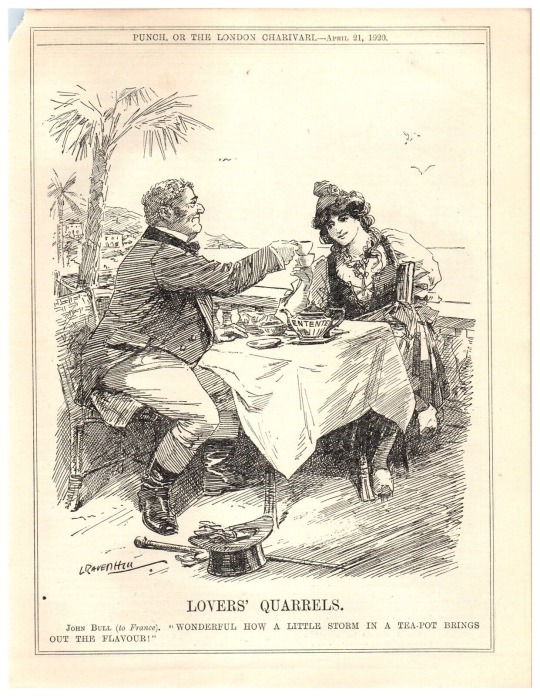
#fruk#aph france#aph fruk#aph england#hws fruk#hws france#hws england#ukfr#aph ukfr#hws ukfr#aph america#hws america
37 notes
·
View notes
Text
24 Days of La Fayette: December 18th - Charles-Albert, comte de Moré de Pontgibaud
Charles-Albert, comte de Moré de Pontgibaud was one of La Fayette’s most “unruly” aide-de-camps and I am not exaggerating when I say that he was most likely the Marquis’ least beloved aide-de-camp.
Pontgibaud was born in 1758 and was one of the few individuals in La Fayette’s military circle that were younger than he was. But youth was not the only thing the two of them had in common – just like La Fayette, Pontgibaud was a bit of a troublesome teenager. While his refusal to follow orders landed La Fayette a spot on the American army pay rolls and a page in the history books, things looked different for the Comte. At the tender age of 16 he was imprisoned for a fierce and violent character, and refusing to do any kind of work. Absolutely lovely, what else could one want from an aide-de-camp?
Pontgibaud escaped prison in the fall of 1777 and he left Nantes on October 11, 1777, bound for America, on the Arc en Ciel. His father, a gentleman of 77 years, was reportedly greatly worried by his son’s escapades. While we have no direct letter from his father, we have letters from a nobleman by the name d’Alagnac (that I could not identify any further) addressed to Benjamin Franklin and John Adams. D’Alagnac wrote to John Adams on May 18, 1778:
Dr. Franklin, sir, to whom I had the honor to write for information about a young man, Chevalier de Pontgibaut, who left Nantes on 11 October 1777 on board the Arc en Ciel with letters of recommendation to Messrs. Conway and Lafayette in the hope of being employed with the troops of the United Colonies of America; has replied that he knows nothing on the matter. Permit me then to turn to you, sir, as you have newly arrived from that country and might have some information on the whereabouts of the Chevalier or the Arc en Ciel and you would greatly oblige me if you would have the goodness to inform me as to the fate of the one or the other. This young man, filled with ardor and eager to achieve glory in the service of such a worthy cause, is very dear to his family and his silence, since his departure, deeply worries his father, Comte de Chalier, a venerable old man of 77. Would it be too much of an imposition on you, sir, to ask you to ease his anxiety by condescending to discover what has become of this young man on the supposition that you have no information at hand. I dare hope for a favorable response to my request, sir, and I have the honor to be with a great respect, sir, your most obedient and humble servant
“Alagnac to John Adams: A Translation, 18 May 1778,” Founders Online, National Archives, [Original source: The Adams Papers, Papers of John Adams, vol. 6, March–August 1778, ed. Robert J. Taylor. Cambridge, MA: Harvard University Press, 1983, pp. 132–133.] (12/18/2022)
Let us try to ease the old man’s anxiety and have a look at what happened to his son. Pontgibaud’s ship made it to the mouth of the Chesapeake Bay. There it was attacked by a British frigate and either run aground or outright sunk. Pontgibaud managed to get ashore where the few belongings he was able to safe from the wreck were stolen. That certainly was not his lucky day. He travelled to the army encampment at Valley Forge and it was there that he met La Fayette for the first time. Since Pontgibaud a letter of introduction for La Fayette and Conway, it is safe to assume that he wished to be employed by one of the two. But I let him tell his story:
I presented myself to him, and told him frankly my whole story. He listened to my history with attention and kindness, and at my request enrolled me as a volunteer. He also wrote to France and before long received a reply confirming the truth of my statements; he then appointed me one of his aides-de-camp, with the rank of Major, and from that moment never ceased to load me with benefits and marks of confidence.
Chevalier de Pontgibaud [Charles-Albert de More], A French Volunteer of the War of Independence, trans. and ed. Robert B. Douglas [1897; reprinted., Port Washington, N.Y.: Kennikat Press, 1968], pp. 41-42).
La Fayette wrote himself in a letter to Patrick Henry on January 3, 1778:
Receive, Sir, my sincere thanks for the trouble you have taken in sending me some letters from France. Is it not very uncivil to be importune upon the same matter? But I have heard from a gentleman in Hampton who is reccommanded to me and is just now arrived with a parcel of letters. His vessel has been sunk by some eglish frigate, three men only have escaped, he did not save any thing but a trunk and a bag which, he says, have been braked and plundered a schore. He seems in a great distress. I take the liberty of giving to him some hopes by the inclosed letter that you will be so good as to order some notice to be taken of him. I desire him also to direct his dispatches to your excellency in case you would Give yourself the trouble of sending them to General Washington as you have done for the others.
Idzerda Stanley J. et al., editors, Lafayette in the Age of the American Revolution: Selected Letters and Papers, 1776–1790, Volume 1, December 7, 1776–March 30, 1778, Cornell University Press, 1977, p. 211-212.
Pontgibaud’s commission as a Major was approved in February of 1778.
Not much is to be found about Pontgibaud’s early service as a volunteer and later as an aide-de-camp. He was however helpful to La Fayette during the joined efforts of the French fleet and the American troops in Rhode Island. In a letter to La Fayette, d’Estaing tells the Marquis that his aide-de-camp Pontgibaud had helped the French officers in counting and identifying several British ships.
At one point in time, I can not say with certainty when, Pontgibaud returned to France. It is probably that he sailed with La Fayette on the Alliance but even if that had not been the case, both men were in Paris around the same time. La Fayette was the first of the two to return to America and when Pontgibaud followed suit, he carried mail and packets for the Marquis on his person. If there is one thing to know about La Fayette, then that he was very invested in his mail and Pontgibaud appears to not have been up to the Marquis’ standard. Pontgibaud arrived onboard the Alliance on August 16, 1780 in Boston and La Fayette wrote to George Washington on August 28, 1780:
No pontgibault as yet, which Added to our Circumstances of provisions, and our dull prospects of inaction, Makes me feel very uneasy.
“To George Washington from Major General Lafayette, 28 August 1780,” Founders Online, National Archives, [Original source: The Papers of George Washington, Revolutionary War Series, vol. 28, 28 August–27 October 1780, ed. William M. Ferraro and Jeffrey L. Zvengrowski. Charlottesville: University of Virginia Press, 2020, pp. 14–15.] (12/18/2022)
He wrote to the Vicomte de Noailles on September 2, 1780:
We are tired of the whole thing, my friend. I have cursed about M. de Pontgibaud so much that I do not know what more to say, and I am stupefied by this miracle of negligence. Eighteen days to come from Boston! The only way to explain the enigma is that Poirey is with him, which I have learned from the gazette (because Poirey has been given full coverage in the papers), and Poirey stops at every wonder he sees here. I cannot tell you how much this delay distresses me. There are a thousand things apart from the public service that I would like to know; but I promise you at least that if I have any news I will not delay in sharing it with you.
Idzerda Stanley J. et al., editors, Lafayette in the Age of the American Revolution: Selected Letters and Papers, 1776–1790, Volume 3, April 27, 1780–March 29, 1781, Cornell University Press, 1980, p. 156-159.
He wrote to Prince de Poix on September 3, 1780:
Have you ever seen anything like it, my dear prince, and have I not reason to curse and despair? The Alliance has arrived and brought me letters; I know they are in Boston, and the officer who carries them calmly entertains himself buying horses. Good God, if he did not have my packet in his pocket, how much bad luck I would wish him! This accursed man, M. de Pontgibaud, flanked by M. de La Colombe and friend Poirey, set foot on land almost three weeks ago. He said he had important dispatches to deliver to me, so important that he refused to confide a single letter to an officer of the French army who was returning to Rhode Island, and apparently he thinks they are too important to travel other than by easy stages. Meanwhile I am getting angry, and increasingly so as I see how useless it is.
Idzerda Stanley J. et al., editors, Lafayette in the Age of the American Revolution: Selected Letters and Papers, 1776–1790, Volume 3, April 27, 1780–March 29, 1781, Cornell University Press, 1980, p. 164-167.
Finally he wrote to the Chevalier de La Luzerne on September 17, 1780:
M. de Pontgibaud had only one packet for you, delivered by a merchant and entrusted to his care with little sense of urgency; he sent it by the post the day after he arrived, but I reprimanded him for it nonetheless.
Idzerda Stanley J. et al., editors, Lafayette in the Age of the American Revolution: Selected Letters and Papers, 1776–1790, Volume 3, April 27, 1780–March 29, 1781, Cornell University Press, 1980, p. 174-175.
While La Fayette at times certainly was unhappy with Pontgibaud, he nevertheless rendered important and valuable service and continued to serve for the entire duration of war, only resigning his position after the Battle of Yorktown. Their wartime service was not the last time that the two men would meet. Pontgibaud attended a “Board of Officers” that met on March 8, 1784 in La Fayette’s house to discuss the claims of several officers to be admitted in the Society of the Cincinnati. In the context of said meeting, La Fayette wrote a list of Names of the American officers wearing now in France the badge of the society of the Cincinnati and Pontgibaud’s name is on that list. Charles-Albert, comte de Moré de Pontgibaud died in 1837.
#24 days of la fayette#la fayette's aide-de-camp#marquis de lafayette#la fayette#french history#american history#history#american revolution#letter#charles-albert comte de moré de pontgibaud#john adams#patrick henry#benjamin franklin#prince de poix#chevalier de la luzerne#george washington#1777#1778#1779#1780#1758#1837#society of the cincinatti#1784#vicomte de noailles#alliance#d'Estaing
10 notes
·
View notes
Text
Battle of Monmouth day!!!
Yippee! It's been a while since I made one of these kinds of posts! I'm like a day off, but it's fine.
246 years ago today, the battle of Monmouth, the last battle of the Philadelphia campaign, which started in 1777, was fought on the 28th of June 1778. sometimes called the Battle of Monmouth Courthouse because, well, it was near Monmouth Courthouse. In the battle, the continentals were commanded by Washington and Charles Lee, and the redcoats were commanded by Sr. Henry Clinton.
In the Philadelphia campaign prior to this battle, the continentals had suffered multiple major losses to the British, such as the battle of Germantown, Brandywine, and the battle or massacre of Paoli. All of these losses led to the British taking over and occupying Philadelphia. The continentals in Washington's camp had stayed at Valley Forge over the winter to train rigorously and recover mentally and physically from the previous battles.
Due to the Treaty of Alliance between France and America, established in 1778, for the French to offer support to America via their military and trade, Sr. Henry Clinton was given the orders to evacuate Philadelphia and begin coming up with new defence strategies because, with the treaty, the war made a massive turn in favour of the continentals. The redcoats marched out of Philadelphia, across New Jersey, and went off by boat to New York. The Continentals followed close behind, and it would've been stupid to let the Redcoats just leave. Washington ordered nearly a third of the army following him to go ahead and accept the command of Major General Charles Lee. The plan was to do a whole lot of damage to the British without causing anything major for the continentals.
Immediately when the battle began, Lee messed up an attack on the rear group of retreating soldiers, and in response, the main group of soldiers started fighting back, forcing Lee and his fraction of an army to retreat and wait for Washington and the rest of the continentals. After Washington arrived, Clinton's army disengaged and assumed their march. In the march, Clinton split his army into two groups: the first was comprised of mainly combat troops, and the second group handled transporting items. Throughout the march, Clinton's army was harassed by the Continentals, who got closer and closer to the Redcoats with each passing day. The day before the battle, Washington spoke with the more senior officers at the front of the continental army, but he didn't give a battle plan. Lee, believing he knew exactly when and how to attack, made his own meeting after Washington left. Lee's plan was to attack as soon as he heard the British were on the move, as he believed that was when they'd be most vulnerable.
On the 28th of June, the British left the Monmouth courthouse, and Lee, hearing of their movement, ordered Brigadier General Anthony Wayne with some 550 men to attack the rear of the British army in place while he led the rest of the front group to the left with the intention of outflanking the British, but he never told his subordinates, Brigadier Generals Charles Scott and William Maxwell, of his plan and once again failed. Clinton heard of the attack on the rear of his army and sent the combat group, the first group, back to fight back. When the combat group arrived, the Americans were very quickly outnumbered. Brigadier Generals Charles Scott and William Maxwell's men began to leave because they had no idea what was going on, and Lee's men followed with them. Lee felt like he no longer had control over the army, ordering a general retreat.
At one point, Washington's group caught up, and although they were confused, they had a 2-hour-long battle with the British troops. The battle ended when continental soldiers got high ground on the British, and Clinton ordered his army to withdraw. As Clinton's army was leaving Washington, he ordered two small attacks on the army, and the battle ended at sunset. Lee clearly had some kind of problem with communication because he didn't tell Washington anything about this retreat or battle. The main group of continentals was about 3 km behind Lee's bunch, and while they had fought very well against the British, none of them knew how that fight started. Washington was soon approached by a soldier who told him of Lee's retreat, and then he saw whole units in retreat. None of the officers knew what they were meant to do, and Washington felt alarmed to see them all. In the afternoon, Washington found Lee talking to the last of his men. Lee, in his arrogance, expected praise from Washington; instead, Washington famously voiced his immense disapproval and fury in front of the other soldiers.
Keep in mind that this all happened in New Jersey in June. Many people and their horses were collapsing due to extreme heatstroke.
(Note: I keep checking different sites, and they all say Monmouth happened in completely different ways. This is a combination of the details that seemed to stay consistent on the trustworthy sites, but I'm not 100% sure that this is it; fact-checking this in the morning.)
#amrev#american revolution#american revolutionary war#american history#revolutionary war#history#military history#monmouth
37 notes
·
View notes
Photo
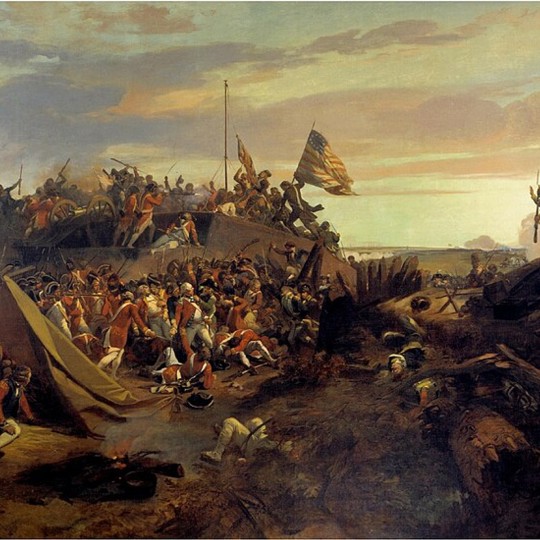
Siege of Yorktown
The Siege of Yorktown (28 September to 19 October 1781) was the final major military operation of the American Revolutionary War (1775-1783). It resulted in the surrender of British general Lord Charles Cornwallis, whose army had been trapped in Yorktown, Virginia, by George Washington's Franco-American army on land, and by Comte de Grasse's French fleet at sea.
Storming of Redoubt 10 During the Siege of Yorktown
Eugène Lami (Public Domain)
War Comes to Virginia
In the spring of 1781, as the American War of Independence approached its sixth year, the British came to Virginia. 1,500 British troops under the command of the American turncoat Benedict Arnold landed at Portsmouth in January, going on to capture and burn the city of Richmond. Arnold was joined two months later by 2,300 more men under Major General William Phillips; together, Phillips and Arnold defeated a Virginia militia force at Blandford in late April before going on to burn the tobacco warehouses at Petersburg. They remained in Petersburg as they awaited the arrival of Lord Charles Cornwallis, who was marching up from North Carolina with 1,500 men, the survivors of the costly British victory at the Battle of Guilford Court House. Cornwallis reached Petersburg on 20 May, several days after General Phillips had died of a fever. Arnold returned to New York in June, leaving Cornwallis in sole command of the combined British army, which numbered over 7,200 men.
Cornwallis was not supposed to be in Virginia. Indeed, Sir Henry Clinton, commander-in-chief of the British forces and Cornwallis' superior officer, had ordered him to merely suppress Patriot resistance in the Carolinas. A task that had, at first, appeared easy enough soon turned into a quagmire, as Patriot and Loyalist militias tore each other to bloody shreds in the South Carolinian backcountry. All the progress Cornwallis had made in pacifying the country quickly unraveled after two defeats at the Battle of Kings Mountain and the Battle of Cowpens. Even his eventual victory at Guilford Court House left a bitter taste in his mouth, as he had lost over 25% of his army and had allowed the elusive American general Nathanael Greene to slip through his fingers. It was clear that his strategy would have to change if he wanted to win the South, no matter General Clinton's orders. His solution had been to invade Virginia. Greene and the Carolinian militias counted on supplies and reinforcements from the Old Dominion; should Virginia fall, Cornwallis calculated the rest of the South would fall with it.
Now, with the strength of Arnold's and Phillips' armies added to his own, Cornwallis put his plan into motion. He first struck toward Richmond, sending a small American army under Gilbert du Motiers, Marquis de Lafayette, running, before dispatching raiding parties into Virginia's heartland to seize supply depots and disrupt lines of communications. Lt. Colonel Banastre Tarleton and his dreaded British Legion were sent to Charlottesville, where Governor Thomas Jefferson and the Virginia General Assembly had relocated after the burning of Richmond; warned of Tarleton's coming, Jefferson and all but seven of the legislators managed to escape into the mountains mere minutes before 'Bloody Ban' arrived to apprehend them. Finally, on 25 June, Cornwallis' main army arrived triumphantly in Williamsburg. It might have been the start to a glorious conquest – had Cornwallis not received fresh orders from General Clinton the very next day.
American War of Independence, 1775 - 1783
Simeon Netchev (CC BY-NC-ND)
The orders were for Cornwallis to suspend military operations in Virginia. Clinton had learned that a sizable French fleet was sailing up from the West Indies, and he feared that New York City (where Clinton himself was located with 10,000 men) was its target. Cornwallis, therefore, was to go on the defensive, march to the nearest deep-water port – Clinton recommended Portsmouth or Yorktown – fortify it, and wait there for further orders. Cornwallis was deeply frustrated by these instructions, as he believed that it was in Virginia where the war would be won. Nevertheless, he did as he was told. He marched out of Williamsburg, pausing only to lay an ambush for Lafayette's pursuing army; the resulting Battle of Green Spring (6 July) bloodied Lafayette's force but did not destroy it. Cornwallis pressed on, ultimately choosing Yorktown as his destination. By 6 August, he had landed his troops there and had begun to fortify both Yorktown and Gloucester Point, just across the York River.
Continue reading...
25 notes
·
View notes
Text
A Deadly "Peacemaker" and Unlikely Matchmaker: The Worst First Date Ever.
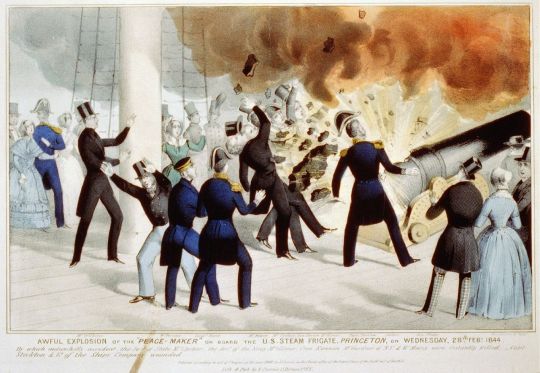
On February 28, 1844, Dolley Madison was far removed from her time as First Lady of the United States, but still held on to her spot as Washington's Greatest Hostess. She was the widow of a bona fide Founding Father, James Madison -- the 4th President of the United States and principal author of the U.S. Constitution and Bill of Rights -- but he had left the White House almost 27 years earlier and died in 1836. However, Dolley -- now 75 years old -- remained a darling of the Washington social scene. Though she often struggled financially, Dolley Madison continued entertaining guests in the nation's capital and helped organize social gatherings around the city, acting as a sort of guest hostess wherever she visited and whenever she was invited -- and she was invited everywhere. Now, as the first auguries of spring began their awakening in-and-around Washington, D.C., Dolley helped plan a cruise down the Potomac River on the newly-built USS Princeton -- a showcase vessel for the United States Navy which happened to be one of the most advanced warships of its time. Nearly 70 years after the Declaration of Independence, Dolley Madison was still the life of the party and an ideal person to help plan a celebration aboard the USS Princeton, just as she'd been doing throughout the entire life of the young American nation.
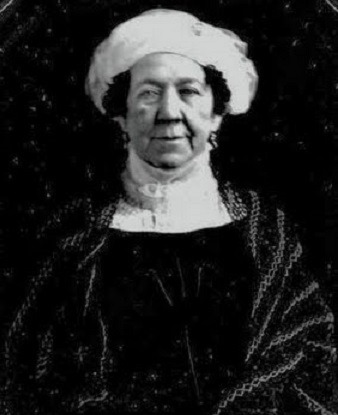
[Dolley Madison, daguerreotype by Mathew Brady in 1848, four years after the Princeton explosion.]
Launched just six months earlier, the Princeton was the U.S. Navy's first propeller-driven warship and its Captain, Robert Field Stockton, was proud of his charge. A cruise to demonstrate the ship's speed, capabilities, and weaponry to the Washington elite would be advantageous to the Navy's growth and to Captain Stockton's ambition. Besides Dolley Madison and the Princeton's crew of 178 sailors, the ship welcomed over 350 guests, including dignitaries such as Secretary of State Abel Upshur, Secretary of the Navy Thomas W. Gilmer, Secretary of War William Wilkins, Postmaster General Charles A. Wickliffe, Senator Thomas Hart Benton, and other diplomats and members of Congress. The most celebrated guest on the Princeton that day, however, was President John Tyler, who had also invited a young woman he had been romantically interested in, Julia Gardiner, and her father, David Gardiner, an influential New York lawyer and former State Senator.
Everyone on board the Princeton had underlying reasons for taking the cruise down the Potomac. For some, it was to see the Princeton for themselves. For others, it was because it was the place to be for politicians and diplomats on that February day. Some took the cruise for the opportunity to observe others, and some took the cruise in order to be noticed. The big draw, however, was a chance to see the Princeton's two large guns -- weapons so big and powerful that they were given their own names: the "Oregon" and the "Peacemaker" -- being fired. Both of the guns were impressive, but the "Peacemaker" was an amazing spectacle. At the time, it was the largest naval gun in the world. The ship was so new and the "Peacemaker" was so potentially devastating that, as of the day of the Princeton's cruise down the Potomac, the weapon had been fired no more than five times, according to Captain Stockton.
In February 1844, John Tyler was entering the final year of a contentious, controversial, and accidental Presidency. Elected as Vice President alongside William Henry Harrison in 1840, Tyler spent only a month in the Vice Presidency before President Harrison died in office. On April 4, 1841, Tyler became the 10th President of the United States, but his succession was not a smooth one. Harrison had been the first President to die in office and the Constitution was not specifically clear about Presidential succession. To many, including everyone in President Harrison's Cabinet, Tyler was still the Vice President and only assumed the duties of the Presidency, not the title or the privileges (such as living in the White House). At his first meeting with the men Harrison had appointed to the Cabinet, the Cabinet all but insisted that they would rule by committee and that Tyler had no more power or influence than, say the Postmaster General (which was a Cabinet-level position until 1971). Many Americans felt that Tyler was merely "Acting President," and that he was to defer to the will of the Cabinet on all issues.
Tyler vehemently disagreed and the manner in which he assumed office set a precedent that was followed by all future Vice Presidents and was eventually cemented into the Constitution. Tyler declared that he was not the Vice President or the "Acting President," but that Harrison's death had propelled him directly into the office of President of the United States to serve out the remainder of Harrison's elected term with the same powers and duties and privileges that come with the office. Tyler moved into the White House and, when his Cabinet balked at his assumption of power, he accepted the resignation of everyone but his Secretary of State, Daniel Webster (Webster eventually resigned in 1843).
President Tyler's troubles did not disappear once Harrison's hand-picked Cabinet departed or after Tyler settled into the Executive Mansion. The slavery question was tearing the nation further and further apart by the day. When Tyler won election in 1840 as Harrison's Vice President, he did so as a member of the Whig Party, but when it came down to Tyler's personal political ideology he was all over the political spectrum. As a younger man, he supported Thomas Jefferson and the Democratic-Republicans and he supported Andrew Jackson during Jackson's first term before Tyler became a Whig. Upon his Vice Presidential nomination, there were questions about Tyler's Whig credentials, but the Whigs needed a strong Southern balance on the ticket and accepted Tyler. But now that General Harrison was dead, President Tyler's independence frustrated his party, which felt that he was not sufficiently Whiggish. With former President Andrew Jackson out of the picture and retired in Nashville, and with Whigs in control of Congress and the White House, the party attempted to establish another Bank of the United States. The Whig Congress pushed through a bill creating a new Bank of the United States, but President Tyler definitively broke ranks with the party that had nominated him for national office and vetoed the bill. Twice. So, just months after assuming the Presidency, Tyler was expelled from the Whig Party and remained a President without a party until he left the White House in 1845.
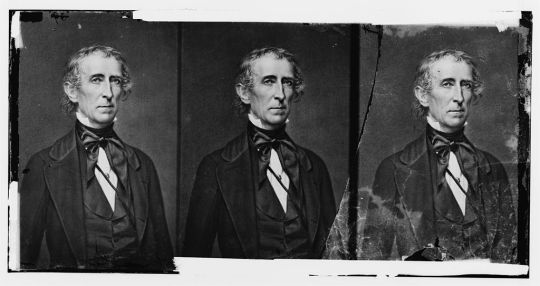
Now, on a warm day at the end of February 1844, Tyler was thinking about whether or not he would support the annexation of Texas. The President also thought of romance. In September 1842, Tyler's wife, Letitia, died in the White House after suffering a stroke. Tyler was still grieving when he began courting Julia Gardiner in January 1843. Tyler had met Julia while his wife was still alive, but he didn't become smitten with her until after his wife's death. Tyler and Julia kept their relationship guarded from the public and the President was even secretive about it to his (very large) family. Part of the reason for his reluctance to be open about his feelings was because Letitia had only been dead for a few months when he started dating Julia. However, a bigger reason was Julia's age. When they began dating, Julia Gardiner was just 22 years old. The 52-year-old President was wary about how his children (he and Letitia had seven children who lived to maturity) would feel about him dating a woman who was five years younger than his oldest daughter.
The age difference also worried Julia's family. Julia Gardiner was the daughter of David Gardiner, a wealthy New York lawyer and former New York State Senator. She was born in 1820 on an island in the Long Island Sound named after her family, and had everything that she wanted or needed while growing up on Gardiner's Island. Julia was beautiful and much in demand by the eligible bachelors of the East Coast. After meeting President Tyler, Julia first tried to reject his advances, but she was certainly intrigued by the powerful and charming Virginian. For his part, Tyler was madly in love with Julia and he first proposed to her in late-1843. Julia's mother did not approve of her daughter marrying a man 30 years older than Julia, so Tyler didn't get an answer. By inviting Julia and her father to accompany him on the USS Princeton, John Tyler hoped to show David Gardiner that he could impress the wealthy New Yorker and demonstrate that he could be a wonderful husband to Julia.
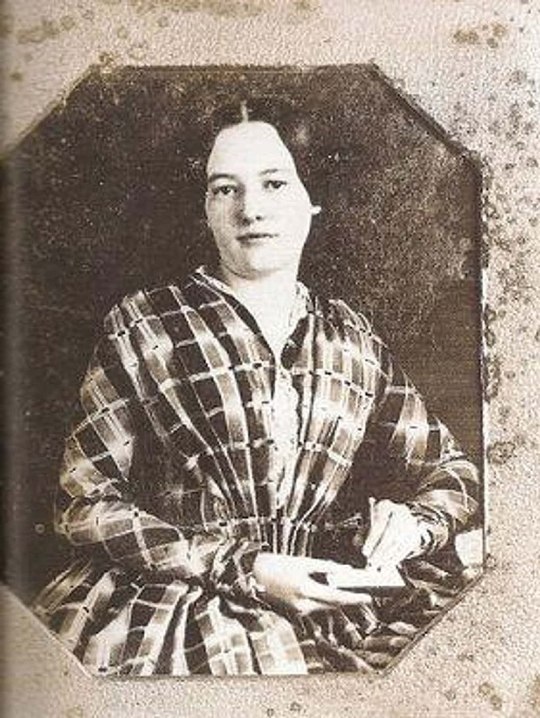
[Julia Gardiner Tyler, around the time of the Princeton explosion and her marriage to President Tyler, c. 1844]
•••
Guests gathered at the Washington Navy Yard as ferries transported them across the Potomac River to Alexandria, Virginia, where the USS Princeton was anchored and ready for the afternoon cruise down the Potomac. As dignitaries boarded Captain Stockton's ship, they marveled at the size of the two guns on deck and examined every inch of the 164-foot warship. Music was provided by the United States Marine Band -- "The President's Own" -- and food was served below deck as the Princeton began its leisurely cruise down the Potomac. As guests explored the Princeton and watched the historic sites on both shores of the Potomac pass by, the massive "Peacemaker" gun was fired to the delight of everyone on the ship. The rounds fired by the powerful "Peacemaker" were capable of traveling up to three miles. As the warship cruised down the river the rounds that were fired were aimed at ice floes in the distance which were breaking apart as the afternoon sun warmed the Potomac. The cruise continued, with men mostly on the deck and pretty much all women below deck where food and drinks flowed freely, conversation was genial, and some of the guests were gleefully singing and clearly enjoying themselves.

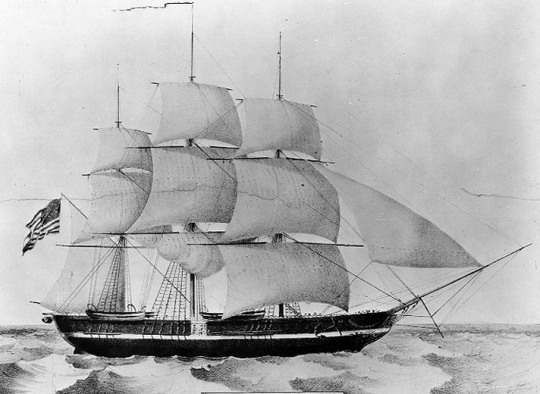
When the Princeton reached Mount Vernon and George Washington's sprawling estate came into view, the ship fired another round from the "Peacemaker" in tribute the first President and then turned around for the return trip to Washington, D.C. The Princeton's passengers had gathered below deck for celebratory toasts and to listen to the impromptu singing concert taking place in the salon. At around 4:00 PM, some of the men requested a chance to witness the "Peacemaker" being fired again, but Captain Stockton demurred, telling the men, "No more guns tonight." However, one of the men who wished to see the "Peacemaker" fired once again was Thomas W. Gilmer, the man who had become Secretary of the Navy just 10 days earlier -- a man who just happened to be Captain Stockton's superior. Gilmer's wish was something akin to an order to Captain Stockton, so Stockton headed to the deck and had the gun prepared to be fired once more.
Many of the men began heading upstairs to witness the firing of the "Peacemaker" while the women mostly remained below deck and continued with their songs and conversations. President Tyler was heading up the gangway plank towards the deck when he was told that his son-in-law, William Waller, the husband of his daughter Elizabeth, was about to sing one of Tyler's favorite songs. Instead of heading to the deck, the President headed back into the salon and was handed a drink. Upstairs, men crowded around the giant "Peacemaker" for one last demonstration of its firing power.
On the deck, Secretary of War William Wilkins jokingly told the spectators, "Though I am Secretary of War, I do not like this firing, and believe I shall run!" before moving to the far side of the Princeton. The remainder of the guests were close to the "Peacemaker" and the big gun was ready to be fired. The Princeton was about 15 miles downriver from Washington, D.C. and two sailors took the final steps for firing the weapon.
Suddenly, at 4:06 PM, a massive explosion rocked the Princeton and the deck was obscured by white smoke and an eerie silence. President Tyler rushed up to the deck to investigate what had happened, but what he found was a horrific scene. The "Peacemaker" -- the largest naval gun in the world -- had exploded at the breech. The powerful explosion tore part of the ship's deck and the "Peacemaker" broke into red-hot pieces of iron that flew into the crowd of spectators. Nobody downstairs was injured, but the deck of the Princeton was a place of horror. Eight people had been killed and 17 were seriously injured, including Captain Stockton and Senator Thomas Hart Benton. As President Tyler reached the deck, the silence turned to anguished screams and confusion.
The President fought through the smoke and found that the toll was high. Secretary of State Abel Upshur was dead -- literally disemboweled by the blast. Navy Secretary Gilmer was dead. The Princeton's Commander Beverly Kennon and two Princeton sailors were dead. American diplomat Virgil Maxcy was dead. President Tyler's slave, Armistead, who had requested and been granted permission from Tyler to view the gun as it was being fired was dead. And, finally, David Gardiner -- the father of the woman that the President hoped to marry -- was also killed by the blast, his arms and legs severed from his body by the force of the explosion. A tearful President was devastated by the loss of two of his senior Cabinet members, and he headed back down below deck to notify the women about what had happened. With dozens of victims and witnesses screaming, crying, and/or in shock throughout the ship, there was an attempt to keep most of the passengers below so that they didn't see the gruesome scene on the deck.
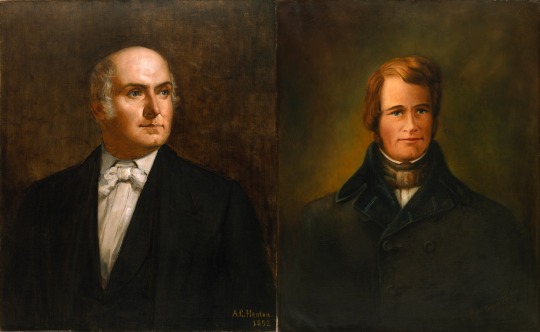
[Secretary of State Abel Upshur and Secretary of the Navy Thomas W. Gilmer, who were both killed by the explosion on Feb. 28, 1844.]
The smoke-filled deck of the Princeton was covered with blood, dismembered limbs, dead bodies, and stunned survivors, many of whom had been wounded by pieces of red-hot, iron shrapnel from the gun or pieces of human beings torn apart by the explosion. Throughout the ship, ears were ringing and people were rendered temporarily deaf by the sound of the blast. Below decks, the women who had accompanied the Princeton awaited more news from above, which quickly trickled downstairs. Someone yelled, "The Secretary of State is dead!" and the news did not improve. When Julia Gardiner found out that her father was among those who had been killed in the blast, she fainted -- directly into the arms of President Tyler. Dolley Madison, who had seen much in her 75 years -- during the War of 1812, she barely escaped the White House shortly before British forces captured Washington and burned the Capitol and the Presidential Mansion -- was certainly stunned by the tragedy aboard the ship, but she quickly did her best to comfort the Princeton's passengers who were shaken and distressed.
As the USS Princeton limped back to Washington, D.C., John Tyler comforted Julia Gardiner as best as he could. For the President, his pleasure cruise with the woman he hoped to marry and her wealthy father could not have gone worse. Now, David Gardiner was literally laying in pieces on the deck of the Princeton as Tyler -- who was also returning to Washington without a Secretary of State or Secretary of the Navy -- tried to console Gardiner's young daughter, but she remained unconscious until the ship arrived back in Alexandria, Virginia.
When the Princeton arrived at Alexandria, President Tyler physically carried Julia Gardiner from the wounded warship. On the gangplank, Julia finally awakened in the President's arms, and as she later said, "I struggled so that I almost knocked both of us off the gangplank. I did not know at the time, but I learned later it was the President whose life I almost consigned to the water." President Tyler had Julia taken directly to the White House where she spent the next few days recuperating under the watchful eyes of the President and his large family.
The bodies of Julia's father, the two dead Cabinet members (Secretaries Upshur and Gilmer), the Princeton's Commander Kennon, and the diplomat Maxcy remained on board the Princeton on the night of February 28th. The injured went to hospitals and homes around the capital city. The next day, Washington was in official mourning as the word of the tragedy spread and the signs of mourning -- black crepe hanging on the White House and other public buildings --were displayed. As Washington mourned, the bodies of Gardiner, Upshur, Gilmer, Kennon, and Maxcy were transported to the White House, where their flag-draped caskets rested in honor in the East Room. (It's safe to assume that President Tyler's slave wasn't awarded the same honors -- when the bodies were removed from the Princeton, they were all placed in magnificent mahogany caskets, except for Armistead, who was placed in one made from cherry. The President did reportedly give Armistead's mother $200.)
After two days of lying in state in the East Room of the White House, Gardiner, Upshur, Gilmer, and Kennon were transferred to St. John's Episcopal Church, where all of official Washington showed up to pay their respects at their joint funeral (Maxcy's family took his remains for a private funeral and burial shortly after his body arrived at the Executive Mansion). It was a solemn occasion -- one of the biggest tragedies to strike the United States up to that point, and a significant loss to President Tyler, both professionally and personally. Tyler was mourning two important members of his Cabinet, and the woman he hoped to marry was burying her father after he had been killed in the most gruesome manner imaginable on a cruise that Tyler had invited him to take.
The funeral started with an ominous and unfortunate signal: the firing of loud artillery across from the Executive Mansion could not have been a pleasant reminder to those who had survived the tragedy on board the Princeton a few days earlier. The bodies of Upshur, Gilmer, Kennon, and Gardiner were taken to Congressional Cemetery following the funeral and buried there, although Gardiner was later exhumed and reburied on Gardiner's Island in New York. After narrowly escaping death or serious injury on the Princeton a few days earlier, President Tyler found himself in danger once again as he left the funeral. Traveling through the busy streets of Washington in his horse-drawn carriage, the President's horses were startled by the crowds and bolted -- leaving Tyler helpless in a runaway carriage until a man bravely rushed out from a hotel entrance and helped stop the carriage.
•••
Being comforted by President Tyler and his immediate family in the aftermath of her father's death changed Julia Gardiner's mind about marrying the much older President. Tyler had done everything possible to console her and make her feel safe in the days after the Princeton explosion. Later, Julia would write that, "After I lost my father, I felt differently towards the President. He seemed to fill the place and to be more agreeable in every way than any younger man was or could be." While the loss of her father was certainly tragic, John Tyler happened to be in the right place at the right time, and, in a strange way, David Gardiner's death may have helped spark the romance between the President and Gardiner's daughter. Several weeks after the Princeton tragedy, Tyler asked Julia's mother (who herself was nearly a decade younger than the President!) for her blessing to marry Julia and Mrs. Gardiner approved of the union.
Still, the marriage was not without controversy. The wedding took place on June 26, 1844, just a few months after the Princeton explosion. Julia and her family were still in mourning for Mr. Gardiner, so the wedding was solemn and low-key. Plus, the President's family -- particularly his daughters from his first marriage -- were reluctant to accept his new bride. After all, Tyler's first wife had died less than two years earlier, and Julia Gardiner was about the same age as Tyler's daughters; in fact, she was five years younger than Tyler's oldest daughter. One more unique aspect of the wedding was that this was the first time an incumbent President of the United States had ever gotten married while in office. Normally, it would be blockbuster social news, but the President's wedding was kept strictly private.
Accompanied only by his son, John Tyler III, the President and Julia Gardiner were married at the Church of the Ascension in Manhattan (which is still standing today, at Fifth Avenue and Tenth Street in Greenwich Village) on June 26, 1844. Very few people even knew that the President was in town until after the wedding when they heard the salute from the guns of warships in New York Harbor as he and his new First Lady departed the city (again, maybe firing the guns wasn't the greatest idea for this particular couple at that particular time?). According to one of the only eyewitness accounts of the wedding, published in The New York Morning Express the day after the nuptials, the bride was given away by her brother and and "robed simply in white, with a gauze veil depending from a circlet of white flowers wreathed in her hair." After the ceremony, the wedding party held a dinner at Lafayette Place before the President and Mrs. Tyler departed the city by steamer, staying the night in Philadelphia, before proceeding back to Washington on a special train the next day.
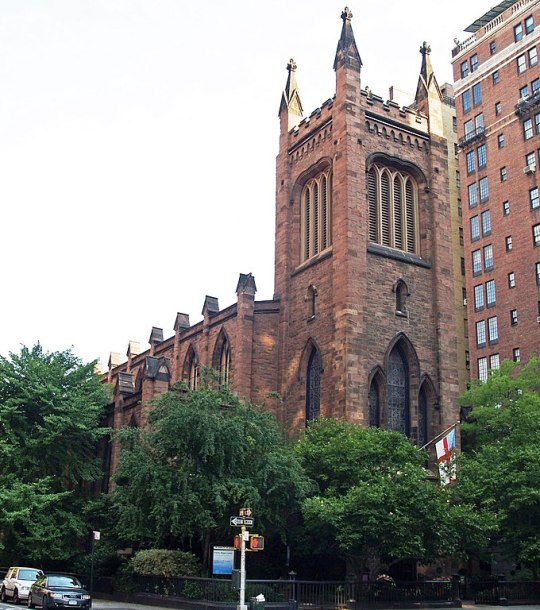
[The Church of the Ascension in Manhattan where President Tyler and Julia Gardiner were married on June 26, 1844.]
When President Tyler left office in 1845, he and his wife retired to Tyler's plantation in Virginia, Sherwood Forest. They had seven children (in addition to the seven surviving children from Tyler's first marriage) and remained happily married, despite the 30-year age difference between the husband and wife. In January 1862, the Tylers headed to Richmond for Tyler's inauguration as a member of the Confederate House of Representatives. Tyler was the only former President who did not remain loyal to the Union during the Civil War. On January 18th, the 71-year-old Tyler died in Richmond's Exchange Hotel, likely due to complications from a stroke and was buried in Richmond's Hollywood Cemetery with Confederate honors. Widely considered a traitor in the North, official notice of Tyler's death wasn't given until 1915 when Congress finally erected a monument near his grave.
Julia Gardiner Tyler lived until 1889, but remarkably, as of 2024, one of President and Mrs. Tyler's grandsons is still living. With seven children (the last of which died in 1947 -- 157 years after John Tyler's birth!), the Tylers were blessed with a wealth of grandchildren and Harrison Ruffin Tyler (born in 1928) is still alive today (his brother, Lyon Gardiner Tyler Jr., died in 2020). In the 1970s, Harrison Tyler purchased and restored his grandfather's beloved Virginia plantation, Sherwood Forest, and often spoke about his family's unique place in history until his health started to fail in recent years.
•••
As for the USS Princeton, well, it never truly recovered from the "Peacemaker" explosion. Captain Robert Field Stockton was absolved of blame for the tragedy and went on to fame in California during the Mexican-American War (he has a city named after him near Sacramento), and later was elected a United States Senator from New Jersey. The Princeton participated in engagements in the Gulf of Mexico during the Mexican-American War, but its hull was found to be rotting after the war ended. It was broken up for scrap in Boston and the "Peacemaker's" twin gun -- the "Oregon" -- can be seen today on the grounds of the United States Naval Academy in Annapolis, Maryland.
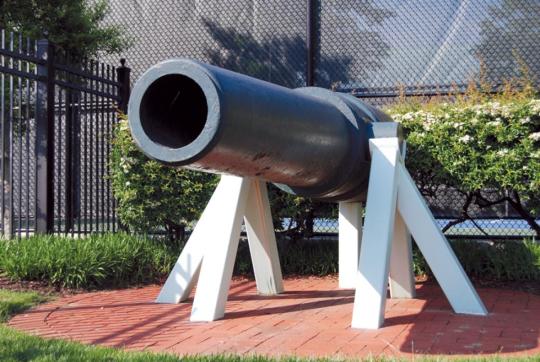
[The "Oregon" gun from the USS Princeton, now on display at the United States Naval Academy in Annapolis, Maryland.]
During World War II, a new USS Princeton was commissioned. A 622-foot-long aircraft carrier, the new Princeton engaged in action in the Pacific Ocean. On October 20, 1944 -- 100 years after the explosion of the "Peacemaker" during President Tyler's Potomac River cruise -- the modern Princeton was attacked by a Japanese dive bomber in the Leyte Gulf and 108 sailors were killed. Even the Princeton's descendants seem to be cursed.

#History#USS Princeton#USS Princeton Explosion#John Tyler#President Tyler#Tyler Administration#Julia Gardiner Tyler#David Gardiner#First Ladies#First Families#Presidential Marriages#Presidential Relationships#Robert Field Stockton#Abel Upshur#Politics#Political History#Military History#WWII#Dolley Madison#Thomas W. Gilmer#Tyler Family#Cabinet of John Tyler#Tyler Cabinet#Presidential History#Presidential Politics#Princeton Explosion#1844 Explosion of the Princeton#U.S. Navy#Naval Accidents#U.S. Naval History
20 notes
·
View notes
Text
Back at the dock awaited the press, officials, George Pocock, Al Ulbrickson, and the few Washington rowing supporters braving the transcontinental trip to support their crew. Henry Penn Burke, dressed in a handsome white double-breasted blazer fastened around his ample waist, with his cleanly pressed white trousers and perfectly shined black shoes, started the ceremonial program.
Standing with Roger Morris, Charles Day, Gordon Adam, and John White on his right, Robert Moch next to him, and Jim McMillin, Shorty Hunt, Joe Rantz, and Don Hume on his left, Burke started talking about the glory that is crew racing, the fantastic event everyone had just witnessed, and the victory he expected in Berlin. He talked. And talked. And talked. And gestured, smiled, and kept talking. The sun broiled the dock as he held up the ceremonial cup awarded to the nation's top crew. The Husky oarsmen, completely exhausted, started to sway; they had raced without their shirts and now stood bare-chested facing the press and photographers. Burke kept rambling on, praising the Huskies, the Bears, but most especially, his beloved Pennsylvania Quakers. Bob Moch had enough. He reached over and grabbed the handle on the cup opposite the one Burke held. "I gave a little tug on it, on the cup. And it came off— he let go of it," Moch remembered. "He still continued to talk. So we just walked away from it. That's the kind of a guy he was: a blowhard." The oarsmen, then the crowd, and finally the press drifted away as Burke eventually stopped talking and called the ceremony to a close.
— an excerpt from Six Minutes in Berlin: Broadcast Spectacle and Rowing Gold at the Nazi Olympics by Michael J. Socolow
#he literally called him a blowhard oml#he’s so sassy#Bobby is spicy af and I love that for him#the boys in the boat#bobby moch#boys in the boat#olympic trials#joe rantz#roger morris#chuck day#gordy adam#jim mcmillin#george hunt#don hume#Johnny white#quotes#book quotes#BAMF Bobby Moch#kinda#real tbitb
18 notes
·
View notes
Text


Vords words from Count Monty Cristo: “ Velcome my LOVELIEzz! Zhis is zhe Vampire-bat-vampire-Count Monty Cristo zpeaking.
I’ve heard there is zomekind of ‘challenge’ going about. It iz involving things to draw, thoughtz to conjure, ideaz to zew. A ‘prompt’, az it vhere. Vhell, OBVIOUZLY I’m zhe best when it comes to ideaz, but because I’m zo very generouz, I’m also giving you a read-at-your-own-pace list of ztoriez -von right after zhe other for each day of October to enjoy for zhis blez’zed October-zeazon.
Read vone each day and illuztrate vhat you zhee az you read; or, draw zomething that inzpired you from reading zhe ztoriez!
Phantasmagoria by Lewis Carol
Dracula’s Guest by Bram Stoker
The Signal Man by Charles Dickens
Bluebeard by Charles Perrault
Godfather Death by The Brothers Grimm
Feathertop by Nathanial Hawthorne
King of the Cats from old Scotland
The Romance of Certain Old Clothes by Henry James
The Shadow by Hans Christian Anderson
The Landlady by Roald Dahl
There Shall be no Darkness by James Blish
The New Mother by Lucy Clifford
-DEZIGNATED POEM TIME!!!- The Raven, The Cremation of Sam McGee, The Ballad of Tam Lin, Hist Whist, The Rhyme of the Ancient Mariner
The Monkey’s Paw by W.W. Jacobs
There will Come Soft Rains by Ray Bradbury
The Legend of Sleepy Hollow by Washington Irving
Uncle Otto’s Truck by Stephen King
Oh, Whistle and I’ll come to you My Lad by James Joyce
The Lottery by Shirley Jackson
Tailypo from Apalachian Folklore
Fritt-Flacc by Jules Verne
An Occurrence at Owl Creek Bridge by Ambroise Bierce
The Canterville Ghost by Oscar Wilde
Lot. 249 by Arthur Conan Doyle
The Red Room by H. G. Wells
The Cats of Ulthar by H.P. Lovecraft
The Body Snatcher by Robert Louis Stevenson
The Vampyre by John William Pilodori
The Shout by Robert Graves
The Masque of the Red Death or really anything you want by Edgar Allan Poe
Your OWN story
There are zo MANY possibilities to be had! ‘ave at it!” - Monty Cristo
#promptober#inktober#inktober challenge#oddities#odditiesinoctober#oddities in october#literature#horror literature#oddity art#count monty cristo#mouse the witching cat#horror short story#edgar allan poe#ambroise bierce#oscar wilde#stephen king#h.p. lovecraft#h.g. wells#brothers grimm
12 notes
·
View notes